
 |
home ao english musik literatur journalismus bilder sprachen mehr shop sitemap | |
 |
 |
 |
 |
 |
(Deutsch) Dies ist die linguistische Version der ersten Staffel der Jungs. Die Texte sind dieselben wie auf der Hauptseite. |
(English) This is the linguistic version of the first season of the Boys. The texts are the same as on the main page. |
(Français) Voici la version linguistique de la première saison des Gars. Les textes sont les mêmes que sur la page principale. Couleurs : mots simples (vert) phrases nominales (bleu) phrases verbales (ocre) idiomes + collocations (rouge) gros mots + onomatopées + jeux de mots (violet) |
(Italiano) Questa è la versione linguistica della prima stagione dei Ragazzi. I testi sono gli stessi della pagina principale. |
(Español) Esta es la versión lingüística de la primera temporada de los Chicos. Los textos son los mismos que en la página principal. |
(English) The title of this episode is the real headline of the first page of the Kieler Nachrichten of September 18, 2001 (translated here, of course). The editors of the newspaper received this dialog as feedback by e-mail the following day. |
 |
(Italiano) Il titolo di questo episodio è il vero titolo della prima pagina del Kieler Nachrichten del 18 settembre 2001 (ovviamente tradotto qui). I redattori del giornale hanno ricevuto questo dialogo come feedback via e-mail il giorno successivo. |
(Deutsch) Der Titel dieser Episode ist die echte Schlagzeile der ersten Seite der Kieler Nachrichten vom 18.09.2001. Die Redaktion der Zeitung hat diesen Dialog am Tag darauf per E-Mail als Feedback erhalten. Normal Version | ||
Neuanfang 19.09.2001 1
Heinz: Du sag mal: Müssen wir jetzt trotzdem neuanfangen? |
New Beginning 19.09.2001 Heinz: Say, do we have to make this defiant new beginning now? |
19.09.2001 Heinz : Dis-moi, est-ce qu'on doit vraiment repartir de zéro, malgré tout ? |
nonostante tutto 19.09.2001 Heinz: Dimmi, dobbiamo ricominciare nonostante tutto adesso? |
nuevo comienzo 19.09.2001 Heinz: Dime, ¿tenemos que empezar de nuevo así, desafiantes? |
2 Heinz: Ja gut, aber was soll denn jetzt neu sein? Schmecken die Brötchen vielleicht anders? Nö. Haben sich die Ladenöffnungszeiten geändert? Auch nicht. Sag du doch mal, was sich geändert hat! |
Heinz: All right, but what's new now? Do the rolls taste any different? Nope. Have the store hours changed? Neither. Why don't YOU tell me what's changed? |
Heinz : Oui, mais qu'est-ce qui est nouveau ? Les petits pains ont-ils un autre goût ? Non. Les heures d'ouverture du magasin ont-elles changé ? Non plus. Pourquoi ne me dis-tu pas ce qui a changé ? |
Heinz: Va bene, ma cosa c'è di nuovo ora? I panini hanno un sapore diverso? No. Gli orari di apertura del negozio sono cambiati? Nemmeno quelli. Perché non mi dici tu cosa è cambiato? |
Heinz: De acuerdo, pero ¿qué hay de nuevo ahora? ¿Saben diferentes los panecillos? No. ¿Han cambiado los horarios de apertura de la tienda? Tampoco. ¿Por qué no me dices tú qué ha cambiado? |
3 Heinz: Aber wieso merkt man davon denn gar nix? Also der Schily, der ist immer so gelassen, aber er macht den Eindruck, als fiele ihm einfach nichts ein. Der redet doch immer bloß über die Terrorbekämpfung, dabei wissen alle, dass es gar nicht so sehr um die Terroristen geht. |
Heinz: But how come we don't notice anything? Mr. Schily, he's always so relaxed, but he gives the impression that he's simply out of ideas. He's always talking about fighting terror, but everyone knows that the issue isn't so much about the terrorists. |
Heinz : Mais comment se fait-il que nous ne remarquions rien ? M. Schily est toujours très détendu, mais il donne l'impression de ne pas avoir la moindre idée. Il parle toujours de la lutte contre la terreur, alors que tout le monde sait que le problème n'est pas tant les terroristes. |
Heinz: Ma come mai non ci accorgiamo di nulla? Il signor Schily è sempre molto rilassato, ma dà l'impressione di non avere la minima idea. Parla sempre di lotta al terrorismo, ma tutti sanno che il problema non sono tanto i terroristi. |
Heinz: ¿Pero cómo es que no notamos nada? El Sr. Schily siempre está muy relajado, pero da la impresión de que no tiene ni idea. Siempre está hablando de luchar contra el terror, pero todo el mundo sabe que el problema no son tanto los terroristas. |
4 Helmut: Es ist anders wegen der Amerikaner. Wenn die jetzt zurückschlagen, dann werden einige Leute im Nahen Osten ziemlich sauer werden. Und weil wir die Verbündeten der Amerikaner sind, werden die dann vielleicht auch sauer auf uns. |
Helmut: It's different because of the Americans. If they strike back now, then some people in the Middle East will get pretty angry. And since we're the Americans' allies, they might get angry with us too. |
Helmut : C'est différent à cause des Américains. S'ils ripostent maintenant, certaines personnes au Moyen-Orient seront très en colère. Et comme nous sommes les alliés des Américains, ils risquent de nous en vouloir aussi. |
Helmut: È diverso a causa degli americani. Se ora fanno una rappresaglia, alcune persone in Medio Oriente si arrabbieranno parecchio. E poiché siamo alleati degli americani, potrebbero arrabbiarsi anche con noi. |
Helmut: Es diferente debido a los americanos. Si contraatacan ahora, algunas personas de Oriente Medio se enfadarán mucho. Y como somos aliados de los estadounidenses, también podrían enfadarse con nosotros. |
5 Helmut: Ja, ich sag dir mal, was los ist: In Zukunft wird es so was nicht mehr geben. Wenn du auch nur den Hauch eines Zweifels aufkommen lässt darüber, dass das Verbrecher waren, dann kommst du sofort in die Maschine. Du kannst dir ja wahrscheinlich vorstellen, dass alle Verdächtigen gut überwacht werden von jetzt an, damit wir unsere freiheitlichen Werte in Ruhe ausleben können, ohne dauernd an irgendwelche Scheiße erinnert zu werden. |
Helmut: Well, I'll tell you what's going on: There won't be anything like this in the future. If you give the slightest hint of doubt that they were criminals, you'll be put straight into the machine. You can probably imagine that all suspects will be under close surveillance from now on so that we can live out our liberal values in peace without being constantly reminded of some shit. | Helmut : Bon, je vais te dire ce qui se passe : À l'avenir, ce genre de choses n'arrivera plus. Si tu laisses planer le moindre doute sur le fait que ce sont des criminels, tu seras immédiatement mis dans la machine. Tu peux probablement t'imaginer que tous les suspects seront désormais bien surveillés, afin que nous puissions vivre nos valeurs de liberté en toute tranquillité, sans qu'on nous rappelle constamment une quelconque merde. |
Helmut: Beh, te lo dico io cosa sta succedendo: in futuro questo genere di cose non accadrà più. Se lasci il minimo dubbio che si tratti di criminali, verrai immediatamente messo nella macchina. Probabilmente puoi immaginare che d'ora in poi tutti i sospetti saranno ben monitorati, in modo da poter vivere i nostri valori di libertà in pace, senza che ci venga ricordata continuamente qualche stronzata. |
Helmut: Bueno, te diré lo que está pasando: en el futuro, este tipo de cosas no volverán a ocurrir. Si das el menor atisbo de duda de que eran delincuentes, te meterán directamente en la máquina. Seguro que te imaginas que, a partir de ahora, todos los sospechosos estarán sometidos a una estrecha vigilancia, para que podamos vivir en paz nuestros valores liberales sin que nos estén recordando constantemente alguna mierda. |
(English) The title of this episode is the real headline of the front page of the Kieler Nachrichten of 19.09.2001 (translated here, of course). The editors of the newspaper received this dialog as feedback by e-mail the same afternoon. |
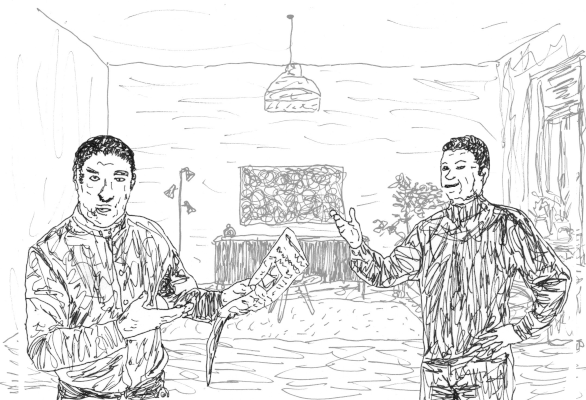 |
(Italiano) Il titolo di questo episodio è il vero titolo della prima pagina del Kieler Nachrichten del 19.09.2001 (ovviamente tradotto qui). I redattori del giornale hanno ricevuto questo dialogo come feedback via e-mail lo stesso pomeriggio. |
(Deutsch) Der Titel dieser Episode ist die echte Schlagzeile der ersten Seite der Kieler Nachrichten vom 19.09.2001. Die Redaktion der Zeitung hat diesen Dialog am selben Nachmittag per E-Mail als Feedback erhalten. Normal Version | ||
19.09.2001 1 Heinz: Du sag mal: Was bedeutet eigentlich: „Besonnenheit wächst”? |
19.09.2001 Heinz: Tell me, what do you think is the meaning of "prudence is growing". |
19.09.2001 Heinz : Dis-moi : que signifie au juste : « La Prudence grandit » ? |
19.09.2001 Heinz: Dimmi: cosa significa esattamente "la prudenza cresce"? |
19.09.2001 Heinz: Dime, ¿qué significa exactamente "la prudencia crece"? |
2 Heinz: Also du sprichst in Rätseln. Gibt es vielleicht etwas, das du mir nicht sagen willst, weil ich es sowieso nicht verstehen würde? Ich glaube, die wollen uns beruhigen, und das beruhigt mich. Immerhin werden die USA zurückschlagen, und zwar heftig, und bis dahin herrscht so eine klebrige Atmosphäre. Keiner will sich auf irgendwas festlegen. Man weiß eben noch nicht genau, wer den Krieg gewinnen wird. |
Heinz: You're talking in riddles. Is there perhaps something you don't want to tell me because I wouldn't understand it anyway? I think they want to calm us down, and that calms me down. After all, the US will hit back, and hard, and until then it's such a sticky atmosphere. Nobody wants to commit to anything, because we just don't know yet exactly who's going to win the war. |
Heinz : Tu parles par énigmes. Il y a peut-être quelque chose que tu ne veux pas me dire parce que je ne le comprendrais pas de toute façon ? Moi je pense qu'ils veulent nous rassurer, et ça me rassure. Après tout, les États-Unis vont riposter, et violemment, et d'ici là, l'atmosphère est tellement poisseuse. Personne ne veut se prononcer sur quoi que ce soit, car on ne sait pas encore exactement qui va gagner la guerre. |
Heinz: Stai parlando per enigmi. Forse c'è qualcosa che non vuoi dirmi perché non lo capirei comunque? Penso che vogliano calmarci, e questo mi calma. Dopotutto, gli Stati Uniti contrattaccheranno, e in modo violento, e fino ad allora l'atmosfera è così appiccicosa. Nessuno vuole impegnarsi, perché ancora non sappiamo esattamente chi vincerà la guerra. |
Heinz: Estás hablando con acertijos. ¿Quizá hay algo que no quieren decirme porque, de todos modos, no lo entendería? Creo que quieren tranquilizarnos, y eso me tranquiliza. Al fin y al cabo, EEUU va a tomar represalias, y violentamente, y hasta entonces el ambiente es tan pegajoso. Nadie quiere comprometerse a nada, porque aún no sabemos exactamente quién va a ganar la guerra. |
3 Heinz: Vielleicht ist auch etwas ganz anderes gemeint. |
Heinz: Maybe something completely different is meant. |
Heinz : Peut-être que la signification est complètement différente. |
Heinz: Forse il significato è completamente diverso. |
Heinz: Quizá el significado sea completamente distinto. |
4 Helmut: Hör zu: Lass mich einfach in Ruhe, okay? Wir sind zivilisierte Menschen, nicht wie diese Attentäter. |
Helmut: Listen, just leave me alone, okay? We're civilized people, not like these terrorists. |
Helmut : Ecoute, laisse-moi tranquille, d'accord ? On est des gens civilisés, pas comme ces assassins. |
Helmut: Ascolta, lasciami in pace, ti dispiace? Siamo persone civili, non come quei terroristi. |
Helmut: Escucha, déjame en paz, ¿vale? Somos gente civilizada, no como estos asesinos. |
(English) The title of this episode is the real headline of the front page of the Kieler Nachrichten of 20.09.2001 (translated here, of course). The editors of the newspaper received this dialog as feedback by e-mail the same afternoon. |
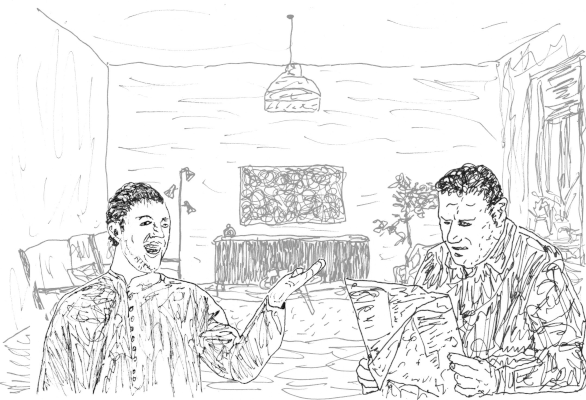 |
(Italiano) Il titolo di questo episodio è il vero titolo della prima pagina del Kieler Nachrichten del 20.09.2001 (ovviamente tradotto qui). I redattori del giornale hanno ricevuto questo dialogo come feedback via e-mail lo stesso pomeriggio. |
(Deutsch) Der Titel dieser Episode ist die echte Schlagzeile der ersten Seite der Kieler Nachrichten vom 20.09.2001. Die Redaktion der Zeitung hat diesen Dialog am selben Nachmittag per E-Mail als Feedback erhalten. Normal Version | ||
20.09.2001 1 Heinz: Jetzt bin ich aber schon froh! |
20.09.2001 Heinz: I have to say, I'm quite glad now! |
20.09.2001 Heinz : Je dois dire que je suis content maintenant ! |
20.09.2001 Heinz: Devo dire che ora sono contento! |
20.09.2001 Heinz: ¡Debo decir que ahora me alegro! |
2 Heinz: Stell dir mal vor, du hättest eine Zeitung und es wäre dein Job, für jeden Tag eine passende Überschrift zu finden. Das ist bestimmt gar nicht so einfach, weil man ja gewissermaßen in die Zukunft hineinschreibt. Man weiß ja noch nicht richtig, was am nächsten Tag geschehen wird. Im Grunde sind das bei der Zeitung alles Propheten. So wie der Finanzminister sagt: „Die Steuern müssen rauf”, so sagen die Journalisten: „Große Einigkeit”. |
Heinz: Imagine you had a newspaper and it was your job to find a suitable headline for every day. It's certainly not that easy, because you're writing into the future, so to speak, and you don't really know what's going to happen the next day. They're basically all prophets at the newspaper. Just as the finance minister says: "Taxes must go up", the journalists say: "Grand Consensus". |
Heinz : Imagine que tu aies un journal et que ton travail consiste à trouver un titre approprié pour chaque jour. Ce n'est certainement pas si facile, car tu écris dans le futur, pour ainsi dire, parce que tu ne sais pas vraiment ce qui va se passer le lendemain. Au fond, ce sont tous des prophètes, au journal. Tout comme le ministre des finances dit : « Les impôts doivent augmenter », les journalistes disent : « Grand Consensus ». |
Heinz: Immagina di avere un giornale e che il tuo compito sia quello di trovare un titolo appropriato per ogni giorno. Non è certo facile, perché stai scrivendo nel futuro, per così dire, e non sai cosa succederà il giorno dopo. In pratica, sono tutti profeti al giornale. Così come il ministro delle finanze dice: "Le tasse devono aumentare", i giornalisti dicono: "Grande concordia". |
Heinz: Imagina que tuvieras un periódico y tu trabajo consistiera en encontrar un titular adecuado para cada día. Desde luego, no es tan fácil, porque estás escribiendo hacia el futuro, por así decirlo. No sabes realmente lo que va a ocurrir al día siguiente. Básicamente, todos son profetas en el periódico. Igual que el ministro de Hacienda dice: "Hay que subir los impuestos", los periodistas dicen: "Gran unidad". |
3 Heinz: Naja, früher waren sich die Leute nie so richtig einig. Es gab Streitigkeiten und man war sich uneins. Dauernd haben die sich beharkt. Dann kam der Elfte September und die Leute sind in sich gegangen. Sie wollen, dass die Gewalt nun endlich aufhört, und dadurch gibt es jetzt große Einigkeit. Das bedeutet also, dass das fürchterliche Ereignis nicht nur Schattenseiten hat; es bringt die Leute auch zusammen. |
Heinz: Well, people never really used to find a consensus. There were conflicts and people disagreed about things. They were always arguing with each other. Then September 11th happened and people started to reflect. They want the violence to finally stop, and as a result there now is grand consensus. Which means that the terrible event doesn't just have a dark side; it also brings people together. |
Heinz : Eh bien, avant, les gens n'ont jamais vraiment eu l'habitude de trouver un consensus. Il y avait des disputes et des désaccords. Ils se disputaient tout le temps. Et puis le 11 septembre est arrivé et les gens se sont mis à réfléchir. Ils veulent que la violence s'arrête enfin, et c'est pourquoi il y a maintenant une grande concorde. Ce qui signifie que ce terrible événement n'a pas seulement un côté sombre, mais qu'il rapproche aussi les gens. |
Heinz: Beh, prima le persone non trovavano mai un consenso. C'erano discussioni e disaccordi. Discutevano in continuazione. Poi è successo l'11 settembre e la gente ha iniziato a riflettere. Vogliono che la violenza si fermi finalmente ed è per questo che ora c'è una grande concordia. Ciò significa che questo terribile evento non ha solo un lato oscuro, ma unisce anche le persone. |
Heinz: Bueno, la gente nunca solía llegar a un consenso. Había discusiones y la gente no estaba de acuerdo en las cosas. Discutían todo el tiempo. Entonces ocurrió el 11 de septiembre y la gente empezó a reflexionar. Querían que la violencia cesara de una vez y por eso ahora hay una gran unidad. Lo que significa que este terrible acontecimiento no solo tiene un lado oscuro, sino que también une a la gente. |
4 Helmut: Ach so, du spinnst wieder rum. Jetzt verstehe ich. Du willst dich lustig machen. Weißt du, so hin und wieder entgeht mir deine Kritik auch nicht. |
Helmut: Oh, you're being silly again. Now I understand. You want to make fun of me. You know, every now and then get your criticism doesn't escape me. |
Helmut : Ah oui, tu es encore en plein délire. Je comprends maintenant. Tu veux te moquer. Tu sais, de temps en temps, ta critique ne m'échappe pas, quand même. |
Helmut: Oh sì, stai di nuovo delirando. Ora capisco. Vuoi prendermi in giro. Sai, di tanto in tanto le tue critiche non mi sfuggono. |
Helmut: Ah sí, estás delirando otra vez. Ahora lo entiendo. Quieres burlarte de mí. Sabes, de vez en cuando no se me escapan tus críticas. |
5 Helmut: Ach ja? Denkst du! Es gibt natürlich den Kulturkampf. Glaubst du, die haben das World Trade Center in die Luft gejagt, weil einer seine Schulden nicht bezahlt hat? |
Helmut: Oh yeah? That's what you think! Of course there is a cultural struggle. Do you think they blew up the World Trade Center just because someone didn't pay their debts? |
Helmut : Ah oui ? Tu parles ! Bien sûr qu'il y a la lutte des cultures. Tu crois qu'ils ont fait sauter le World Trade Center parce que quelqu'un n'avait pas payé ses dettes ? |
Helmut: Oh sì, lo pensi tu! Certo che c'è una lotta culturale. Pensi che abbiano fatto esplodere il World Trade Center solo perché qualcuno non ha pagato i suoi debiti? |
Helmut: ¡Ah, sí, eso crees! Claro que hay una lucha de culturas. ¿Crees que volaron el World Trade Centre porque alguien no pagó sus deudas? |
(English) This episode also is about the headline of the day of the Kieler Nachrichten, this time from 21.09.2001. The editors of the newspaper received this dialog as feedback by e-mail the same afternoon. |
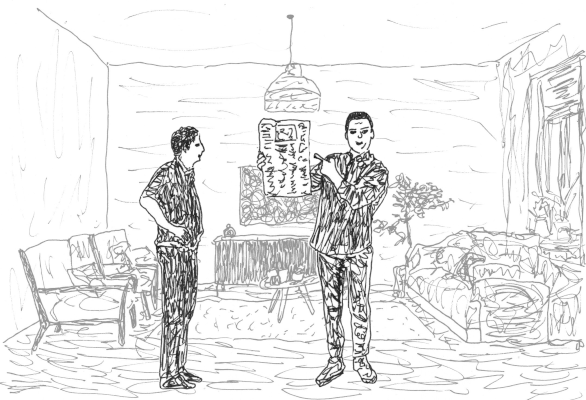 |
(Italiano) Questo episodio riguarda anche il titolo del giorno del Kieler Nachrichten, questa volta del 21 settembre 2001. I redattori del giornale hanno ricevuto questo dialogo come feedback via e-mail lo stesso pomeriggio. |
(Deutsch) Auch in dieser Folge geht es um die Schlagzeile des Tages der Kieler Nachrichten, dieses Mal vom 21.09.2001. Die Redaktion der Zeitung hat diesen Dialog am selben Nachmittag per E-Mail als Feedback erhalten. Normal Version | ||
mit der Zeitung 21.09.2001 1 Helmut: Und? |
with the Newspaper 21.09.2001 Helmut: So? |
avec le journal 21.09.2001 Helmut : Et alors ? |
con il giornale 21.09.2001 Helmut: E allora? |
con el periódico 21.09.2001 Helmut: ¿Y qué? |
2 Heinz: Quatsch, das ist doch kein Kulturkampf! Also das haben wir im Westen nun wirklich nicht nötig, uns auf dieses Level herunterzubewegen! Aber es irritiert mich schon ... |
Heinz: Nonsense, it's not a cultural struggle! We in the West really don't need to stoop to that level! But it does confuse me... |
Heinz : Turlututu. Ce n'est pas une lutte des cultures ! En Occident, nous n'avons vraiment pas besoin de nous abaisser à ce niveau ! Mais ça m'irrite quand même... |
Heinz: Sciocchezze, non è una lotta culturale! Noi occidentali non abbiamo proprio bisogno di abbassarci a questo livello! Ma mi irrita comunque... |
Heinz: ¡Tonterías, no es una lucha de culturas! En Occidente de verdad no tenemos por qué rebajarnos a ese nivel! Pero me confunde todavía... |
3 Helmut: Nein, du Idiot, die doch nicht! Die Terroristen werden geschlachtet. Früher hätten wir ja ganz andere Sachen mit den Terroristen gemacht. |
Helmut: No, idiot, "by" them, not them! The terrorists are slaughtered. Before, we would have done very different things with the terrorists. |
Helmut : Non, idiot, « par » eux, pas eux ! Ce sont les terroristes qui sont massacrés. Autrefois, nous aurions fait des choses très différentes avec les terroristes. |
Helmut: No, sciocco, non loro! I terroristi vengono massacrati. In passato, avremmo fatto cose completamente diverse ai terroristi. |
Helmut: ¡No, tonto, "por" ellos, no ellos! Los terroristas son masacrados. Antes habríamos hecho cosas muy distintas a los terroristas. |
4 Helmut: Na wenigstens wissen die jetzt alle, dass Bin Laden weggehen soll, damit wir wieder ohne Terroristen leben können. |
Helmut: Well, at least they all know now that Bin Laden should go away so that we can live without terrorists again. |
Helmut : Au moins, ils savent tous maintenant que Ben Laden doit partir pour que nous puissions à nouveau vivre sans terroristes. |
Helmut: Beh, almeno ora tutti sanno che Bin Laden dovrebbe andarsene per permetterci di vivere di nuovo senza terroristi. |
Helmut: Bueno, al menos ahora todos saben que Bin Laden debe desaparecer para que podamos volver a vivir sin terroristas. |
5 Heinz: Klar, wenn Bin Laden das lesen sollte, wird er sich bestimmt in die Hose machen. Wo soll er eigentlich hingehen? |
Heinz: Of course, if Bin Laden reads this, he'll certainly soil himself. Where is he supposed to go, by the way? |
Heinz : Bien sûr, si Ben Laden lit ça, il va certainement faire dans son pantalon. Au fait, où est-il censé aller ? |
Heinz: Naturalmente, se Bin Laden leggerà questo articolo, se la farà sicuramente addosso. A proposito, dove dovrebbe andare? |
Heinz: Por supuesto, si Bin Laden lee esto, seguro que se mea en los pantalones. Por cierto, ¿dónde se supone que va a ir? |
(English) This episode also is about the headline of the day of the Kieler Nachrichten, this time from 22.09.2001. The editors of the newspaper received this dialog as feedback by e-mail the same afternoon. |
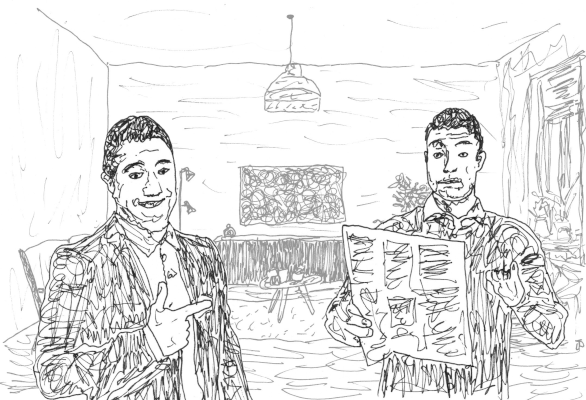 |
(Italiano) Questo episodio riguarda anche il titolo del giorno del Kieler Nachrichten, questa volta del 22 settembre 2001. I redattori del giornale hanno ricevuto questo dialogo come feedback via e-mail lo stesso pomeriggio. |
(Deutsch) Auch in dieser Folge geht es um die Schlagzeile des Tages der Kieler Nachrichten, dieses Mal vom 22.09.2001. Die Redaktion der Zeitung hat diesen Dialog am selben Nachmittag per E-Mail als Feedback erhalten. Normal Version | ||
22.09.2001 1 Heinz: Ich glaube, die haben sich wieder beruhigt. |
22.09.2001 Heinz: I think they've calmed down again. |
22.09.2001 Heinz : Je crois qu'ils se sont calmés. |
22.09.2001 Heinz: Credo che si siano calmati di nuovo. |
22.09.2001 Heinz: Creo que se han vuelto a calmar. |
2 Heinz: Hatte er nicht auch Strapse an? |
Heinz: Wasn't he also wearing suspender straps? |
Heinz : Il ne portait pas de porte-jarretelles aussi ? |
Heinz: Non indossava anche il reggicalze? |
Heinz: ¿No llevaba también liguero? |
3 Helmut: Ach ja, und was würdest du denn tun, um die Lage zu entspannen? |
Helmut: Oh yes, and what would you do to ease the situation? |
Helmut: Ah oui, et que ferais-tu pour calmer la situation ? |
Helmut: Oh sì, e tu cosa faresti per alleviare la situazione? |
Helmut: Ah, sí, ¿y qué harías tú para aliviar la situación? |
4 Heinz: Vertrauen heißt ja nicht, dass ich ihn mag. Es heißt nur, dass ich ihn ernstnehme. Die meisten Leute, die ihn unterstützen, sind doch bloß sauer, weil die reichen Länder immer so tun, als wären sie das Maß der Welt. Dann denken die armen Länder: Nicht nur, dass die das ganze Geld haben, die glauben auch, dass sie die ganze Wahrheit haben. Dann sagen die reichen Länder wieder: Ach, was wollen die denn? Die haben ja nix! Und schon eskaliert die Geschichte. |
Heinz: Trust doesn't mean that I like him. It just means that I take him seriously. Most people who support him are just angry because the rich countries always act as if they are the measure of the world. Then the poor countries think: not only do they have all the money, they also think they have all the truth. Then the rich countries say in turn: Oh, them? What do they want, the have-nots? And then the whole thing escalates. |
Heinz : Faire confiance ne signifie pas que je l'aime bien. Cela signifie seulement que je le prends au sérieux. La plupart des gens qui le soutiennent sont simplement en colère parce que les pays riches agissent toujours comme s'ils étaient la mesure du monde. Alors les pays pauvres pensent : non seulement ils ont tout l'argent, mais ils pensent aussi qu'ils ont toute la vérité. Alors les pays riches disent à leur tour : Oh, qu'est-ce qu'ils veulent ? Ils n'ont rien du tout ! Et voilà que l'histoire s'envenime. |
Heinz: Fiducia non significa che mi piace. Significa solo che lo prendo sul serio. La maggior parte delle persone che lo sostengono sono solo arrabbiate perché i paesi ricchi si comportano sempre come se fossero la misura del mondo. Allora i paesi poveri pensano: non solo hanno tutti i soldi, ma pensano anche di avere tutta la verità. E allora i paesi ricchi dicono a loro volta: Oh, cosa vogliono? Non hanno niente! E poi la storia si aggrava. |
Heinz: Confianza no significa que me caiga bien. Solo significa que me lo tomo en serio. La mayoría de la gente que le apoya solo está enfadada porque los países ricos siempre actúan como si fueran la medida del mundo. Entonces los países pobres piensan: no solo tienen todo el dinero, también creen que tienen toda la verdad. Entonces los países ricos dicen a su vez: Oh, ¿qué quieren ellos? ¡No tienen nada! Y entonces la historia se recrudece. |
5 Heinz: Wieso, wer macht sich denn hier über irgendwas lustig? Das ist nur wie ein großer Bruder und ein kleiner, die einander ständig beweisen müssen, dass der eine viel toller ist als der andere. Und dann jault der andere rum und nörgelt und dann demütigt der Große den Kleinen wieder. |
Heinz: Why, who's making fun of anything here? It's just like a big brother and a little brother who constantly have to prove to each other that one is much better than the other. And then the other one whines and nags and then the big one humiliates the little one again. |
Heinz : Pourquoi, qui se moque de quoi que ce soit ici ? C'est juste comme un grand frère et un petit frère qui doivent constamment se prouver que l'un est bien meilleur que l'autre. Et puis l'autre se plaint et râle, et puis le grand humilie à nouveau le petit. |
Heinz: Perché, chi si prende gioco di qualcosa qui? È come un fratello maggiore e un fratello minore che devono continuamente dimostrarsi a vicenda che uno è molto più bravo dell'altro. E poi l'altro si lamenta e brontola e poi il grande umilia di nuovo il piccolo. |
Heinz: ¿Por qué, quién se burla de algo aquí? Es como un hermano mayor y un hermano menor que tienen que demostrarse constantemente que uno es mucho mejor que el otro. Y luego el otro se queja y refunfuña y entonces el mayor vuelve a humillar al pequeño. |
(English) The Boys approach a cave in Afghanistan. How do they get there and what do they do there? Both questions will be answered, but the first only more than a hundred episodes later. |
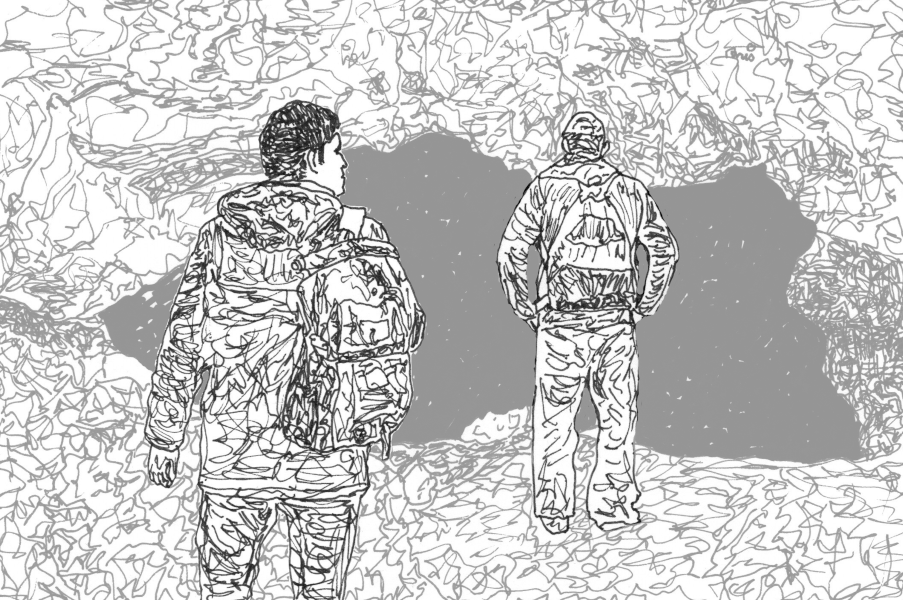 |
(Italiano) I Ragazzi si avvicinano a una grotta in Afghanistan. Come ci arrivano e cosa ci fanno? Entrambe le domande trovano risposta, ma la prima solo più di cento episodi dopo. |
(Deutsch) Die Jungs nähern sich einer Höhle in Afghanistan. Wie kommen sie dort hin und was tun sie dort? Beide Fragen werden beantwortet, die erste allerdings erst mehr als hundert Folgen später. Normal Version | ||
2001 1 Heinz: Jetzt warte doch mal! |
2001 Heinz: Hey, wait a minute! |
2001 Heinz : Hé, attends un peu ! |
2001 Heinz: Ehi, aspetta un attimo! |
2001 Heinz: ¡Eh, espera un momento! |
2 Heinz: Hast du das Nachtsichtgerät? |
Heinz: Do you have the night vision goggles? |
Heinz : Tu as les lunettes de vision nocturne ? |
Heinz: Hai gli occhiali per la visione notturna? |
Heinz: ¿Tienes las gafas de visión nocturna? |
3 Helmut: Warum musst du das immer wieder machen? Glaubst du, es hilft mir, wenn du dauernd diesen Mist wiederholst? |
Helmut: Why do you always have to do this? Do you think it helps me when you constantly repeat this crap? |
Helmut : Pourquoi dois-tu toujours faire ça ? Tu crois que ça m'aide si tu répètes sans cesse ces conneries ? |
Helmut: Perché devi sempre fare così? Credi che mi sia d'aiuto quando ripeti continuamente queste sciocchezze? |
Helmut: ¿Por qué siempre tienes que hacer esto? ¿Crees que me ayuda que repitas constantemente estas chorradas? |
4 Heinz: Und so näherten sich die tapferen alliierten Truppen der Höhle des Löwen. Würden sie die Terroristen überwältigen? Würden sie ... |
Heinz: And so the brave allied troops approached the lion's den. Would they defeat the terrorists? Would they... |
Heinz : Et c'est ainsi que les braves troupes alliées s'approchèrent de la tanière du lion. Vont-ils vaincre les terroristes ? Vont-ils... |
Heinz: E così le coraggiose truppe alleate si avvicinarono alla tana del leone. Riusciranno a sopraffare i terroristi? Riusciranno a... |
Heinz: Y así, las valientes tropas aliadas se acercaron a la boca del lobo. ¿Derrotarían a los terroristas? ¿Podrían...? |
5 Heinz: Komm lass uns hier verschwinden. Helmut? Oh Scheiße. Helmut!!! |
Heinz: Come on, let's get out of here. Helmut? Oh shit. Helmut!!! |
Heinz : Allez, sortons d'ici. Helmut ? Oh, merde. Helmut !!! |
Heinz: Dai, usciamo di qui. Helmut? Oh, merda. Helmut!!! |
Heinz: Venga, vámonos de aquí. ¿Helmut? Oh, mierda. ¡¡¡Helmut!!! |
6 Heinz: Wieso das denn jetzt? Wenn ich vorhin nicht aus Versehen geschrien hätte, hätten wir uns trotzdem verirrt. |
Heinz: Why, what'd I do now? Even if I hadn't accidentally yelled, we still would've got lost. |
Heinz : Pourquoi, qu'est-ce que j'ai fait maintenant ? Même si je n'avais pas crié par mégarde, on se serait quand même perdus. |
Heinz: Ma cosa ho fatto adesso? Anche se non avessi urlato per sbaglio, ci saremmo comunque persi. |
Heinz: ¿Por qué, qué he hecho ahora? Aunque no hubiera gritado accidentalmente, igual nos habríamos perdido. |
7 Helmut: Früher war das echt leichter! |
Helmut: Back then this was so much easier! |
Helmut : A l'époque, c'était vraiment plus facile ! |
Helmut: In passato era davvero più facile! |
Helmut: ¡En el pasado era mucho más fácil! |
(English) Heinz has become a Bahai, which he tries to explain to his friend. At first, Helmut is only surprised at the news, but as time goes on, it becomes clear that he has some deep-seated doubts. Heinz remains undeterred. |
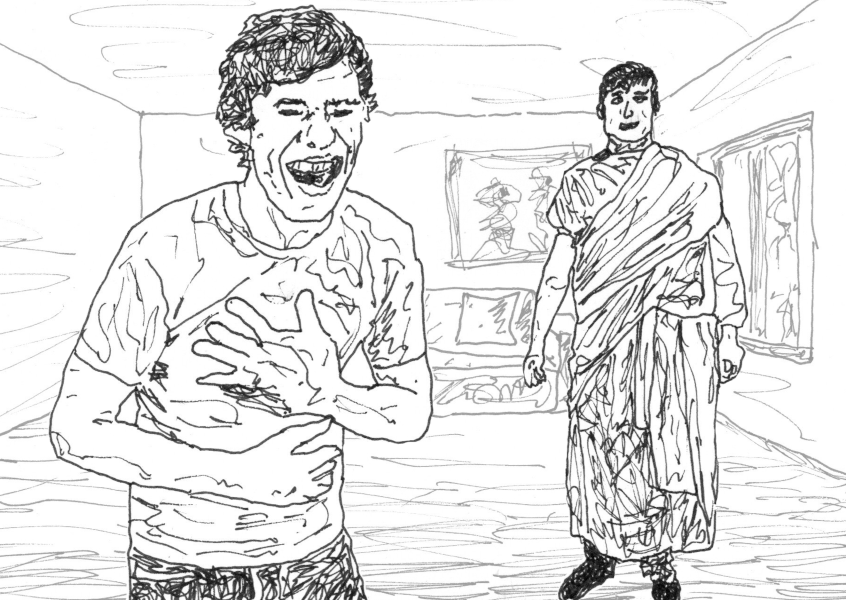 |
(Italiano) Heinz è diventato un Bahai e cerca di spiegarlo al suo amico. All'inizio Helmut è solo sorpreso dalla notizia, ma con il passare del tempo si rende conto che ha dei dubbi profondi. Heinz non si lascia influenzare. |
(Deutsch) Heinz ist Bahai geworden, was er seinem Freund zu erklären versucht. Zunächst wundert sich Helmut nur über die Neuigkeiten, doch mit der Zeit merkt man, dass er tief sitzende Zweifel hat. Heinz lässt sich nicht beirren. Normal Version | ||
2001 1 Heinz: Choda Hafez! |
2001 Heinz: Khoda Hafez! |
2001 Heinz : Khoda Hafez ! |
2001 Heinz: Khoda Hafez! |
2001 Heinz: ¡Khoda Hafez! |
2 Helmut: Würdest du mir bitte verraten, was das alles soll? |
Helmut: Would you please tell me what this is all about? |
Helmut: Tu veux bien me dire ce qui se passe ? |
Helmut: Mi vuoi dire che significa tutto questo? |
Helmut: ¿Podrías decirme qué significa todo esto por favor? |
3 Helmut: Dann hat dich Fiona also gestern noch erreicht. |
Helmut: So Fiona managed to reach you yesterday, then. |
Helmut: Fiona a donc réussi à te joindre hier. |
Helmut: Quindi Fiona è riuscita a mettersi in contatto con te ieri. |
Helmut: Así que Fiona consiguió llegar a ti ayer. |
4 Heinz: Mann, ich kann noch nix anderes! Die Schrift ist so schwer! |
Heinz: Man, I can't do anything else yet! The letters are so difficult! |
Heinz : Mec, je ne peux rien dire d'autre pour l'instant ! Les lettres sont si difficiles ! |
Heinz: Amico, non posso ancora dire altro! I caratteri sono così difficili! |
Heinz: ¡Tío, todavía no puedo hacer nada más! ¡Las letras son tan duras! |
5 Helmut: Natürlich! Mann, das ... du verstehst aber auch gar nichts! |
Helmut: Of course! Man, that... you don't understand anything! |
Helmut: Bien sûr ! Mec, ça... tu ne comprends rien ! |
Helmut: Certo! Amico, tu... non capisci nulla! |
Helmut: ¡Por supuesto! Tío, eso... ¡tú no entiendes nada! |
6 Heinz: Nein, sie hat gesagt, dass sie das schon immer vermutet hatte. Sie hat mir ja auch neulich diese Bahai-Broschüren aus dem Reisebüro mitgebracht. |
Heinz: No, she said that she had always suspected that. She also brought me these Bahai brochures from the travel agency the other day. |
Heinz : Non, elle a dit qu'elle l'avait toujours soupçonné. C'est d'ailleurs elle qui m'a apporté ces brochures bahá'íes de l'agence de voyage l'autre jour. |
Heinz: No, ha detto che lo aveva sempre sospettato. In effetti, mi ha anche portato questi opuscoli bahai dall'agenzia di viaggi l'altro giorno. |
Heinz: No, dijo que siempre lo había sospechado. Además, el otro día me trajo estos folletos bahai de la agencia de viajes. |
(English) When Helmut comes home from the gym, he is no longer his old self. Heinz quickly gets to the bottom of the matter and with his jaw dropped he hears what happened the hour before. He can hardly believe it. |
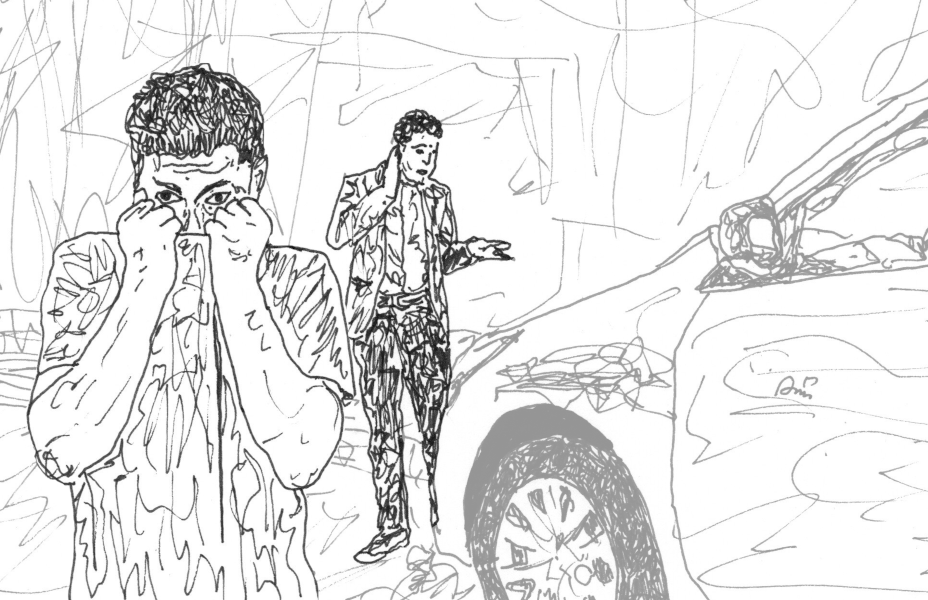 |
(Italiano) Quando Helmut torna a casa dalla palestra, non è più quello di prima. Heinz va subito a fondo della questione e con la mascella abbassata sente cosa è successo l'ora prima. Quasi non riesce a crederci. |
(Deutsch) Als Helmut aus dem Fitnessstudio nach Hause kommt, ist er nicht mehr der Alte. Heinz kommt der Sache schnell auf die Schliche und hört mit heruntergelassener Kinnlade, was sich in der Stunde zuvor abgespielt hat. Er kann es kaum glauben. Normal Version | ||
2001 1 Heinz: Na, wie war's beim Sport? |
2001 Heinz: Well, how was it at the gym? |
2001 Heinz : Alors, comment était le sport ? |
2001 Heinz: Allora, com'è andato lo sport? |
2001 Heinz: Bueno, ¿qué tal el deporte? |
2 Heinz: Sag mal, Helmut, was ist eigentlich los mit dir? War irgendwas? |
Heinz: Tell me, Helmut, what's going on with you? Has anything happened? |
Heinz : Dis-moi, Helmut, qu'est-ce qui ne va pas chez toi ? Quelque chose s'est passé ? |
Heinz: Dimmi, Helmut, cosa ti succede? C'è qualcosa che non va? |
Heinz: Dime, Helmut, ¿qué te pasa? ¿Ha ocurrido algo? |
3 Heinz: Na und? Ich will eben etwas für den Frieden tun. Das weißt du ganz genau. Na los, gib mir die Autoschlüssel! |
Heinz: So what? I want to do something for peace. You know that very well. Come on, give me the car keys! |
Heinz : Et alors ? Je veux faire quelque chose pour la paix. Tu le sais très bien. Allez, donne-moi les clés de la voiture ! |
Heinz: E allora? Voglio fare qualcosa per la pace. Lo sai bene. Dai, dammi le chiavi della macchina! |
Heinz: ¿Y qué? Solo quiero hacer algo por la paz. Lo sabes muy bien. Vamos, ¡dame las llaves del coche! |
4 Helmut: Mann, die ist mir da einfach so reingefahren. |
Helmut: Man, she just bumped into me like that. |
Helmut : Mec, elle m'a percuté comme ça. |
Helmut: Amico, mi è schiantata contro così. |
Helmut: Tío, acaba de chocar así contra el coche. |
5 Heinz: Oh nein. Okay, pass mal auf. Sag einfach, was du mit ihr gemacht hast. Ich bin dein Freund. Also sag es einfach. |
Heinz: Oh no. Okay, listen. Just tell me what you did with her. I'm your friend. So just say it. |
Heinz : Oh non. D'accord, écoute. Dis-moi simplement ce que tu as fait d'elle. Je suis ton ami. Alors dis-le ! |
Heinz: Oh no. Ok, ascolta. Dimmi solo cosa hai fatto con lei. Sono tuo amico. Quindi dillo e basta. |
Heinz: Oh no. Vale, escucha. Solo dime lo que le hiciste. Soy tu amigo. Así que dilo. |
6 Heinz: Du, sag mal ... |
Heinz: Say... |
Heinz : Dis donc. |
Heinz: Dimmi una cosa. |
Heinz: Dime una cosa. |
(English) Helmut is plagued by feelings of guilt. He turns to his friend, who gives him all kinds of good advice, but it turns out that Heinz himself has not yet reached the end of his wisdom. |
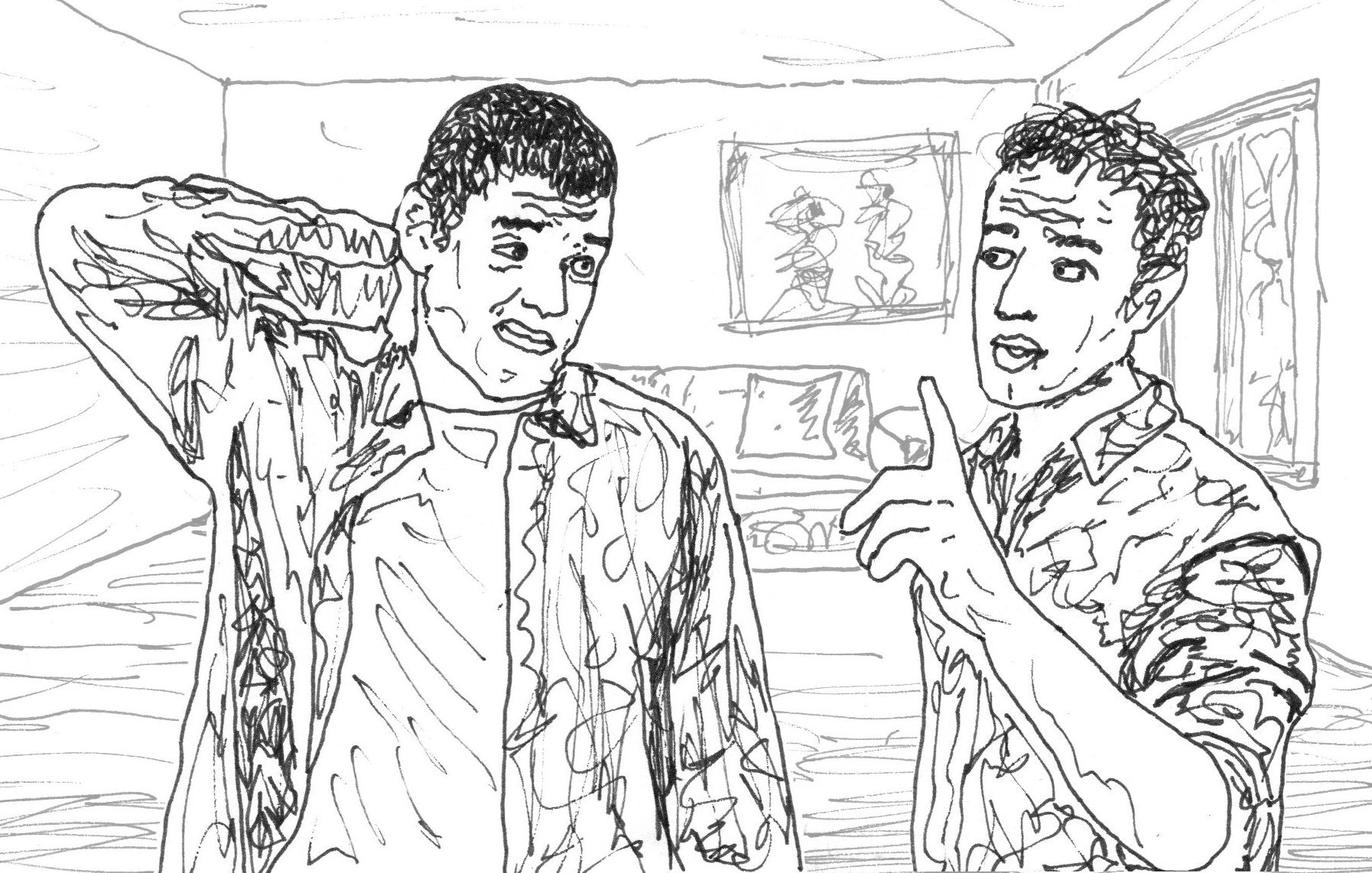 |
(Italiano) Helmut è tormentato dai sensi di colpa. Si rivolge al suo amico, che gli dà ogni tipo di buon consiglio, ma si scopre che Heinz stesso non ha ancora raggiunto la fine della sua saggezza. |
(Deutsch) Helmut plagen Schuldgefühle. Er wendet sich an seinen Freund, der ihm allerhand gute Tipps gibt, allerdings stellt sich heraus, dass Heinz selbst noch nicht am Ende der Weisheit angekommen ist. Normal Version | ||
2001 1 Helmut: Du, Heinz, sag mal ... |
2001 Helmut: Heinz, say... |
2001 Helmut : Heinz, dis-moi... |
2001 Helmut: Dimmi, Heinz... |
2001 Helmut: Dime, Heinz... |
2 Helmut: Aha aha, das klingt ja schon ganz gut. Und angenommen, jemand hätte in dieser Welt der Widersprüche und der Gegensätze einen Fehler gemacht. Wie geht's dann weiter? |
Helmut: I see, that sounds quite good. And suppose someone had made a mistake in this world of contradictions and opposites. How does it go on then? |
Helmut : Je vois, d'accord, ça sonne plutôt bien. Et supposons que quelqu'un ait fait une erreur dans ce monde de contradictions et d'oppositions. Comment cela se passe-t-il alors ? |
Helmut: Ah, mi sembra bene. E supponiamo che qualcuno commetta un errore in questo mondo di contraddizioni e contrasti. Cosa succederebbe allora? |
Helmut: Ah, eso me parece bien. Y supongamos que alguien comete un error en este mundo de contradicciones y contrastes. ¿Qué ocurre entonces? |
3 Heinz: Was dir fehlt, ist Demut. |
Heinz: You lack humility, that's all. |
Heinz : Ce qui te manque, c'est l'humilité. |
Heinz: Quello che ti manca è l'umiltà. |
Heinz: Lo que te falta es humildad. |
4 Heinz: Natürlich. Du kennst doch den Spruch: „Seid nett zueinander”, oder? |
Heinz: Of course. You know the saying, "Be nice to each other", right? |
Heinz : Bien sûr. Tu connais le dicton : « Soyez gentils les uns avec les autres », n'est-ce pas ? |
Heinz: Certo. Conosci il detto: "Siate gentili con gli altri", vero? |
Heinz: Por supuesto. Conoces el dicho: "Sed amables unos con otros", ¿verdad? |
5 Heinz: Dass die schon wieder so früh ist! Na hallo, Fiona, mein Knusperstern. Kaffee ist gleich fertig. Setz dich doch. |
Heinz: I can't believe she's so early again! Well hello, Fiona, my crispy star. Coffee will be ready soon. Sit down. |
Heinz : Qu'elle soit déjà si tôt ! Salut, Fiona, mon étoile croquante. Le café sera bientôt prêt. Assieds-toi donc. |
Heinz: È di nuovo in anticipo! Ciao, Fiona, mio zuccherino croccante. Il caffè sarà pronto tra poco. Siediti. |
Heinz: ¡Otra vez tan temprano! Hola, Fiona, mi dulzura crujiente. Pronto estará listo el café. ¿Por qué no te sientas? |
6 Helmut: Nö, überhaupt nicht. Ich kann so was gar nicht. Und ihr seid also immer nett zueinander, was? |
Helmut: Nope, not at all. I wouldn't even know how. So you are always nice to each other? |
Helmut : Non, pas du tout. Je ne saurais même pas comment. Alors, vous êtes toujours gentils l'un avec l'autre, hein ? |
Helmut: No, per niente. Non saprei nemmeno come fare. Allora, siete sempre gentili tra di voi, eh? |
Helmut: No, en absoluto. Ni siquiera sabría cómo. ¿Así que siempre sois amables el uno con el otro? |
(English) Is it a good idea to go for a spin when one has just found a joint from the New Year's Eve party in the couch crack and enjoyed it? Opinions may be divided, but the boys make their decision. |
 |
(Italiano) È una buona idea fare un giro quando si è appena trovato una canna nella fessura del divano dopo la festa di Capodanno e la si è gustata? I pareri sono discordanti, ma i Ragazzi prendono la loro decisione. |
(Deutsch) Ob es eine gute Idee ist, eine Spritztour zu machen, wenn man gerade einen Joint vom Silvesterfest in der Couchritze gefunden und genossen hat? Man kann darüber geteilter Meinung sein, die Jungs treffen jedenfalls ihre Entscheidung. Normal Version | ||
Literaturhaus 2001 1 Heinz: Helmuuut!! Komm mal schnell her! |
2001 Heinz: Helmuuut!! Come quickly! |
2001 Heinz : Helmuuut !! Viens vite ! |
2001 Heinz: Helmuuut!! Vieni subito! |
2001 Heinz: ¡¡Helmuuut!! ¡Ven aquí rápido! |
2 Heinz: Eigentlich wollte ich ja heute ins Literaturhaus. |
Heinz: Actually, I wanted to go to the Literaturhaus today. |
Heinz : En fait, je voulais aller à la maison de la littérature aujourd'hui. |
Heinz: In realtà, oggi volevo andare alla casa della letteratura. |
Heinz: En realidad, hoy quería ir a la casa de la literatura. |
3 Heinz: Hey Helmut, du kannst doch mit diesem Teil nicht einfach so auf die Straße! Hi hi, jetzt warte doch mal! Oh Scheiße. |
Heinz: Hey Helmut, you can't just go out on the street with this thing! Hee hee, wait a minute! Oh shit. |
Heinz : Hé Helmut, tu ne peux pas sortir dans la rue avec ça ! Hi hi, attends un peu ! Oh merde. |
Heinz: Ehi Helmut, non puoi uscire per strada con questo coso! Hi hi, aspetta un attimo! Oh, merda. |
Heinz: ¡Eh, Helmut, no puedes salir a la calle con esto! Jij, jij, ¡espera un momento! Oh mierda. |
4 Helmut: Macht nix, nehm ich eben die nächste. |
Helmut: Never mind, I'll just take the next one. |
Helmut : C'est pas grave, je prendrai la suivante. |
Helmut: Non c'è problema, prenderò la prossima. |
Helmut: No importa, cogeré el siguiente. |
5 Heinz: Moment ... |
Heinz: Wait a minute... |
Heinz : Attends un peu... |
Heinz: Aspetta un attimo... |
Heinz: Espera un momento... |
6 Helmut: Chichi, schuldigung, geht schon wieder. He, Sie Flegel! Lassen Sie mich los! Hi hi |
Helmut: Hihih, sorry, I'm alright now. Hey, you lout! Let go of me! Hee hee |
Helmut : Chichi, désolé, ça va maintenant. Hé, espèce de brute ! Lâchez-moi ! Hi hi |
Helmut: Hihih, scusa, ora sto bene. Ehi, cafone! Lasciami in pace! Hi hi |
Helmut: Jiji, lo siento, ya estoy bien otra vez. ¡Eh, patán! ¡Suéltame! Jij, jij |
7 Heinz: Du hältst ja immer noch dieses Teil in der Hand! |
Heinz: You're still holding that thing in your hand! |
Heinz : Tu tiens toujours ce truc dans ta main ! |
Heinz: Stai ancora tenendo quella cosa in mano! |
Heinz: ¡Todavía tienes esa cosa en la mano! |
(English) The Boys stroll through the city and are enchanted by Kiel's charm. When Helmut gets the idea to pay a visit to the newspaper, they make a terrible discovery. |
 |
(Italiano) I Ragazzi passeggiano per la città e rimangono incantati dal fascino di Kiel. Quando a Helmut viene l'idea di fare una visita al giornale, fanno una terribile scoperta. |
(Deutsch) Die Jungs schlendern ausgelassen durch die Stadt und lassen sich vom Kieler Charme verzaubern. Als Helmut auf die Idee kommt, der Zeitung einen Besuch abzustatten, machen die beiden eine fürchterliche Entdeckung. Normal Version | ||
2001 1 Helmut: Wieso hast du jetzt noch einen Burger? |
2001 Helmut: Why do you have another burger? |
au journal 2001 Helmut : Pourquoi as-tu un autre burger maintenant ? |
al giornale 2001 Helmut: Perché ora hai un altro hamburger? |
2001 Helmut: ¿Por qué tienes ahora otra hamburguesa? |
2 Helmut: Na da oben, auf dem Zeitungsgebäude. |
Helmut: Up there, on the newspaper building. |
Helmut : Là-haut, sur le bâtiment du journal. |
Helmut: Lassù, sull'edificio del giornale. |
Helmut: Ahí arriba, en el edificio del periódico. |
3 Heinz: Und was willst du da drin machen? |
Heinz: And what do you want to do in there? |
Heinz : Et qu'est-ce que tu veux y faire ? |
Heinz: E cosa vuoi fare lì dentro? |
Heinz: ¿Y qué quieres hacer ahí dentro? |
4 Helmut: Jetzt komm schon! |
Helmut: Come on now! |
Helmut : Allez, maintenant ! |
Helmut: Andiamo! |
Helmut: ¡Venga ya! |
5 Helmut: Kuck mal, da sitzen sie und schreiben die Zeitung für uns. Guten Tag, die Damen! |
Helmut: Look, there they are, writing the newspaper for us. Hello, ladies! |
Helmut : Regarde, les voilà qui écrivent le journal pour nous. Bonjour, mesdames ! |
Helmut: Guarda, eccole che scrivono il giornale per noi. Buongiorno, signore! |
Helmut: Mira, ahí están sentadas, escribiendo el periódico para nosotros. ¡Buenas tardes, señoras! |
6 Helmut: Wir sollten die Ambulanz anrufen. |
Helmut: We should call the ambulance. |
Helmut : On devrait appeler l'ambulance. |
Helmut: Dovremmo chiamare l'ambulanza. |
Helmut: Deberíamos llamar a la ambulancia. |
(English) The bathroom needs tiling and the Boys take on the task, even though neither of them is quite up to it. Helmut just won't wake up and Heinz would rather play. Well, what could possibly go wrong? |
 |
(Italiano) Il bagno ha bisogno di essere piastrellato e i Ragazzi si assumono il compito, anche se nessuno dei due è all'altezza. Helmut non si sveglia e Heinz preferisce giocare. Beh, cosa potrebbe mai andare storto? |
(Deutsch) Das Badezimmer muss gekachelt werden und die Jungs stellen sich dieser Aufgabe, auch wenn sie beide nicht ganz bei der Sache sind. Helmut wird einfach nicht wach und Heinz will lieber spielen. Nun, was kann schon schiefgehen? Normal Version | ||
2001 1 Helmut: Oh Mensch! Musstest du unbedingt diesen Blaumann anziehen?! |
Laying Tiles 2001 Helmut: Oh man! Did you have to put on that blue coverall?! |
2001 Helmut : Oh mince ! Il fallait vraiment que tu mettes ce bleu de travail ?! |
2001 Helmut: Oh, cavolo! Dovevi proprio metterti quella tuta blu?! |
2001 Helmut: ¡Joder! ¿Tenías que ponerte ese mono? |
2 Heinz: Ey, ich hab den Zement schon angerührt. |
Heinz: Hey, I already mixed the cement. |
Heinz : Hé, j'ai déjà mélangé le ciment. |
Heinz: Ehi, ho già mescolato il cemento. |
Heinz: Oye, ya he mezclado el cemento. |
3 Helmut: Pass auf, du stehst im Zement. |
Helmut: Watch out, you're standing in the cement. |
Helmut : Attention, tu marches dans le ciment. |
Helmut: Attento, stai camminando sul cemento. |
Helmut: Cuidado, estás pisando el cemento. |
4 Heinz: Okay, pass auf. Wir haben da vorne die Kacheln und hier auf der anderen Seite ... aaargh! |
Heinz: Okay, listen. We have the tiles in front there and here on the other side... aaargh! |
Heinz : Bon, écoute. On a les carreaux là et ici de l'autre côté... aaargh ! |
Heinz: Ok, attenzione. Abbiamo le piastrelle lì e qui dall'altra parte... aaargh! |
Heinz: Vale, escucha. Tenemos las baldosas ahí delante y aquí en el otro lado... ¡aaargh! |
5 Helmut: Mann, lass uns kacheln jetzt. Ey, was soll das überhaupt? Ich lag friedlich auf dem Sofa und hab von einem Fußballspiel geträumt, da kommst du in diesem ... |
Helmut: Man, let's tile now. Ey, what's the point, anyway? I was lying peacefully on the sofa, dreaming about a soccer game, and you come in this... |
Helmut : Mec, faisons du carrelage maintenant. Qu'est-ce que tu fais ? J'étais tranquillement allongé sur le canapé et je rêvais d'un match de football, et tu arrives dans ce... |
Helmut: Amico, andiamo a piastrellare adesso. Ehi, qual è il punto, comunque? Ero tranquillamente sdraiato sul divano, sognando una partita di calcio, e tu arrivi in questo... |
Helmut: Tío, ahora vamos a embaldosar. ¿Y qué sentido tiene? Estaba tumbado tranquilamente en el sofá, soñando con un partido de fútbol, y llegas tú con esto... |
6 Heinz: Ja äh, ich leg hier eine weiße Kachel hin. |
Heinz: Yeah, erm, I put a white tile here. |
Heinz : Oui, je pose un carreau blanc ici. |
Heinz: Sì, ehm, io metto una piastrella bianca qui. |
Heinz: Sí, eh, pondré una baldosa blanca aquí. |
| 7 Helmut: Also so werden wir nie fertig. Heinz: Wieso denn? Helmut: Ja, du hast deine bescheuerten Kacheln so hingelegt, dass die schwarzen nicht mehr dazwischenpassen. Heinz: Spart Material. Helmut: Jetzt nimm die Kacheln da wieder raus. Heinz: Nö. Helmut: Mann, der Zement wird hart. Heinz: Meine Kacheln! Helmut: Mann, da sind überall Lücken jetzt. Heinz: Meine Kacheln! Helmut: Da stolpern wir doch dann immer drüber. Heinz: Du kannst ja den Flur schwarz kacheln. Helmut: Ey, was soll'n das sein, Mann? Heinz: Go. Helmut: Ey, ich geh wieder schlafen. Heinz: Jo. |
Helmut: This way we'll never be done. |
Helmut : Comme ça, on n'aura jamais fini. |
Helmut: In questo modo non finiremo mai. |
Helmut: Así no acabaremos nunca. |
(English) Heinz has spent all his Deutschmarks before the currency changeover and is broke, which brings him into a philosophical and at the same tim dépensé tous ses marks avant le changement de monnaie et est fauché, ce qui l'amène à avoir une conversation philosophique et en même temps festive de Noël avec Helmut, qui n'est pas du tout ravi de ce qu'il entend. |
 |
(Italiano) Heinz ha speso tutti i suoi marchi tedeschi prima del cambio di valuta ed è al verde, il che lo porta a una conversazione filosofica e allo stesso tempo natalizia con Helmut, che non è affatto felice di ciò che sente. |
(Deutsch) Heinz hat vor der Währungsumstellung seine ganzen D-Mark ausgegeben und ist pleite, was ihn in ein philosophisches und gleichzeitig weihnachtliches Gespräch mit Helmut bringt, der ganz und gar nicht begeistert ist von dem, was er hört. Normal Version | ||
12.12.2001 1 Heinz: Hast du mal 'n Euro? |
12.12.2001 Heinz: Got a euro on you? |
arrive 12.12.2001 Heinz : T'as un euro ? |
12.12.2001 Heinz: Hai un euro? |
12.12.2001 Heinz: ¿Tienes un euro? |
2 Helmut: Ha ha ha. |
Helmut: Ha ha ha. |
Helmut : Ha ha ha. |
Helmut: Ha ha ha. |
Helmut: Ja, ja, ja. |
3 Helmut: Ja, glaubst du vielleicht, ich schenk dir was, wenn du mir nichts schenkst? |
Helmut: Yeah, you think I give you something if you don't give me anything? |
Helmut : Oui, tu crois que je vais te donner quelque chose si tu ne me donnes rien ? |
Helmut: Sì, pensi che ti regalerò qualcosa se tu non mi regali nulla? |
Helmut: Sí, ¿crees que te regalaré algo si tú no me regalas nada? |
4 Heinz: Du spinnst doch! Als nächstes erzählst du mir wahrscheinlich noch, dass du einen Weihnachtsbaum kaufen willst. |
Heinz: You're crazy! Next you'll probably tell me that you want to buy a Christmas tree. |
Heinz : Mais tu es cinglé ! Ensuite, tu vas probablement me dire que tu veux acheter un sapin de Noël. |
Heinz: Ma sei pazzo! Adesso probabilmente mi dirai che vuoi comprare un albero di Natale. |
Heinz: ¡Estás loco! Después seguro que me dices que quieres comprar un árbol de Navidad. |
5 Helmut: Ja, ich hatte extra ein Geschenk besorgt! |
Helmut: Yeah, I got a present especially for you! |
Helmut : Oui, j'ai un cadeau spécialement pour toi ! |
Helmut: Sì, ho comprato un regalo apposta per te! |
Helmut: ¡Sí, he comprado un regalo especialmente para ti! |
6 Heinz: Was ist eigentlich aus dieser Zickmeier-Geschichte geworden? |
Heinz: So what happened to the Zickmeier story? |
Heinz : Au fait, qu'est-il arrivé à cette histoire de Zickmeier ? |
Heinz: A proposito, che fine ha fatto la storia di Zickmeier? |
Heinz: Por cierto, ¿Y qué pasó con la historia de Zickmeier? |
(English) In this dream sequence, the Boys have an unusual job to do, further away from home than ever before. It seems as if they are overwhelmed by it, but at least they manage to make it back safely. |
 |
(Italiano) In questa sequenza onirica, i ragazzi devono svolgere un lavoro insolito, lontano da casa come non mai. Sembra che siano sopraffatti, ma almeno riescono a tornare sani e salvi. |
(Deutsch) In dieser Traumsequenz haben die Jungs einen ungewöhnlichen Job zu erledigen, so weit entfernt von zu Hause wie nie zuvor. Es scheint so, als seien sie damit überfordert, doch zumindest gelingt ihnen eine sichere Rückkehr. Normal Version | ||
2001 1 Heinz: Funktioniert dein Mikro? |
2001 Heinz: Is your microphone working? |
2001 Heinz : Ton micro fonctionne-t-il ? |
2001 Heinz: Il tuo microfono funziona? |
2001 Heinz: ¿Funciona tu micrófono? |
2 Helmut: Weißt du eigentlich, wie du in diesem Anzug aussiehst? |
Helmut: Do you know what you look like in that suit? |
Helmut : Sais-tu à quoi tu ressembles dans ce costume ? |
Helmut: Sai che aspetto hai con quel vestito? |
Helmut: ¿Sabes qué aspecto tienes con ese traje? |
3 Helmut: Ventil! Wir reparieren ein Ventil. Das muss hier irgendwo sein. Du hast doch den Bauplan von dem Apparat hier. Zeig doch mal her! |
Helmut: Valve! We're repairing a valve. It must be somewhere around here. You've got the blueprint of this machine. Let me take a look! |
Helmut : Une vanne ! Nous réparons une vanne. Elle doit être là quelque part. Tu as le plan de cet appareil. Fais-moi voir ! |
Helmut: Una valvola! Stiamo riparando una valvola. Deve essere qui da qualche parte. Sei tu che hai il progetto di questo dispositivo. Fammi vedere! |
Helmut: ¡Válvula! Estamos reparando una válvula. Debe estar por aquí. Tienes tú el esquema de la máquina. Déjame verlo. |
4 Heinz: Komm, jetzt hör auf damit! Das ist hier eine Stresssituation, wir brauchen Konzentration. |
Heinz: Now stop it! This is a stressful situation, we need to concentrate. |
Heinz : Arrête maintenant ! C'est une situation de stress, nous avons besoin de concentration. |
Heinz: Dai, smettila! Questa è una situazione stressante, dobbiamo concentrarci. |
Heinz: ¡Basta ya! Esta es una situación estresante, tenemos que concentrarnos. |
5 Helmut: Ich wollte diesen Mistplan aufschlagen und hab das Gleichgewicht verloren. |
Helmut: I was trying to open this crappy plan and lost my balance. |
Helmut : J'ai voulu ouvrir ce plan de merde et j'ai perdu l'équilibre. |
Helmut: Stavo cercando di aprire questo piano del cavolo e ho perso l'equilibrio. |
Helmut: Estaba intentando abrir este esquema de basura y perdí el equilibrio. |
6 Heinz: Die Erde sieht ziemlich cool aus von hier, kuck doch mal! |
Heinz: The earth looks pretty cool from here, watch! |
Heinz : La terre a l'air plutôt cool d'ici, regarde ! |
Heinz: La terra sembra piuttosto bella da qui, guarda! |
Heinz: La tierra se ve bastante chula desde aquí, ¡echa un vistazo! |
7 Heinz: Der wird ja immer schneller! |
Heinz: It's getting faster and faster! |
Heinz : C'est de plus en plus rapide ! |
Heinz: Sta diventando sempre più veloce! |
Heinz: ¡Es cada vez más rápido! |
(English) Heinz's East Prussian uncle Waldemar stops off in Hamburg on his way to Königsberg. The Boys pick him up from the airport and spend the evening with him, which ends unexpectedly. |
 |
(Italiano) Waldemar, lo zio prussiano orientale di Heinz, arriva ad Amburgo per un viaggio secondario, passando per Königsberg. I Ragazzi lo vanno a prendere all'aeroporto e trascorrono con lui una serata che si conclude in modo inaspettato. |
(Deutsch) Heinz' ostpreussischer Onkel Waldemar kommt auf einen Abstecher nach Hamburg, auf der Durchreise nach Königsberg. Die Jungs holen ihn vom Flughafen ab und verbringen den Abend mit ihm, der unerwartet endet. Normal Version | ||
2001 1 Heinz: Hast du das Parkticket? |
2001 Heinz: Do you have the parking ticket? |
2001 Heinz : Tu as le ticket de parking ? |
2001 Heinz: Hai il biglietto del parcheggio? |
2001 Heinz: ¿Tienes el ticket del aparcamiento? |
2 Onkel Waldemar: Heeren Se mal, dschunger Mann, send Sie nich der Herr Helmut? |
Uncle Waldemar: Jung man, aren't you Mr. Helmut? |
Oncle Waldemar : Écoutez, djeune homme, vous n'êtes pas Monsieur Helmut ? |
Zio Waldemar: Giovanotto, lei non è il signor Helmut? |
Tío Waldemar: Escuche, joven, ¿no es usted el Sr. Helmut? |
3 Onkel Waldemar: Nu ja, als älterhafter Mänsch is man nich mehr ganz so leifich offe Hinterfieß. |
Uncle Waldemar: Well, as an older man, you're not quite so light on your feet anymore. |
Oncle Waldemar : Eh bien, en tant qu'homme âgé, on n'est plus aussi léger sur les pattes arrière. |
Zio Waldemar: Beh, come uomo anziano, sei non più così leggero sulle zampe posteriori. |
Tío Waldemar: Bueno, como hombre mayor, ya no estás tan ágil. |
4 Helmut: Wir können ja erst mal in die Stadt. Nein nein, setzen Sie sich nur nach vorn. |
Helmut: We could go downtown first. No no, just sit in the front. |
Helmut : Nous pourrions d'abord aller en ville. Non non, asseyez-vous à l'avant. |
Helmut: Possiamo andare prima in città. No no, prego, si accomodi davanti. |
Helmut: Podríamos ir primero a la ciudad. No, no, siéntese delante. |
5 Helmut: Ha ha ha, das ist gut. Ey he, da ist das Casino! Los, lasst uns ins Casino gehen! |
Helmut: Ha ha ha, that's good. Hey, there's the casino! Come on, let's go to the casino! |
Helmut : Ha ha ha, c'est bien. Hé, voilà le casino ! Allez, allons au casino ! |
Helmut: Ah ah ah, bene. Ehi, ecco il casinò! Dai, andiamo al casinò! |
Helmut: Ah ah ah, bene. Ehi, ecco il casinò! Dai, andiamo al casinò! |
6 Helmut: Rien ne vas plus. |
Helmut: Rien ne vas plus. |
Helmut : Rien ne va plus. |
Helmut: Rien ne vas plus. |
Helmut: Rien ne vas plus. |
7 In diesem Stück kommen einige Fachbegriffe aus dem ostpreußischen Dialekt vor, die im Text nicht erklärt werden. Es handelt sich um folgende Vokabeln: dreibastig = vorlaut, frech ; dwatsch = dumm ; glupsch = unfreundlich, launisch ; Handschkes = Handschuhe ; Klotzkorken = Holzschuh ; Klumpatsch = Tolpatsch ; Marjell(che) = Mädchen ; Pomuchelskopp = eingeschränkter Mensch ; Ruscheldups = Zappelhans (Quelle: www.brieskorn.de/Meine_Ahnen/ Dokumentation/Ostpreussisch/ body_ostpreussisch.html). Die Credits für den Schlusssatz mit dem Barjeld gehen an Herrn Primo, der den Satz wörtlich so in einem mailinglistartigen Diskurs geschrieben hat. Er scheint aber nicht der Urheber zu sein. Man findet das, wenn man „keenichsberch + mazurka” googelt. Das Stück „Onkel Waldemar” ist dadurch motiviert, dass ich in gewisser Weise Halb-Ostpreuße bin. |
There are some technical terms from the East Prussian dialect in this basically intranslatable piece that are not explained in the text. These are the following words: dreibastig = cheeky; dwatsch = stupid ; glupsch = unfriendly, moody ; Handschkes = gloves ; Klotzkorken = wooden shoe ; Klumpatsch = bumpkin; Marjell(che) = girl ; Pomuchelskopp = limited person ; Ruscheldups = fidget (source: www.brieskorn.de/Meine_Ahnen/ Dokumentation/Ostpreussisch/ body_ostpreussisch.html). The credits for the final sentence with the Barjeld go to Mr. Primo, who wrote the sentence verbatim in a mailing list-like discourse. However, he does not appear to be the author. You can find it by googling "keenichsberch + mazurka". The piece "Uncle Waldemar" is motivated by the fact that I am, in a way, half East Prussian. |
Dans cette pièce essentiellement intraduisible, il y a quelques termes techniques du dialecte de Prusse orientale qui ne sont pas expliqués dans le texte. Il s'agit des mots suivants : dreibastig = effronté ; dwatsch = stupide ; glupsch = grincheux, de mauvaise humeur ; Handschkes = gants ; Klotzkorken = chaussure en bois ; Klumpatsch = lourdaud ; Marjell(che) = fille ; Pomuchelskopp = personne limitée ; Ruscheldups = enfant agité (source : www.brieskorn.de/Meine_Ahnen/ Dokumentation/Ostpreussisch/ body_ostpreussisch.html). Le mérite de la dernière phrase avec le Barjeld revient à M. Primo, qui a écrit la phrase (en allemand) mot pour mot dans un discours de type liste de diffusion. Cependant, il ne semble pas en être l'auteur. Tu peux le trouver en googlant « keenichsberch + mazurka ». L'épisode « Oncle Waldemar » est motivé par le fait que je suis, d'une certaine manière, à moitié prussien de l'Est. |
Ci sono alcuni termini tecnici del dialetto della Prussia orientale in questo brano sostanzialmente intraducibile che non sono spiegati nel testo. Si tratta delle seguenti parole: dreibastig = sfacciato; dwatsch = stupido; glupsch = ostile, lunatico; Handschkes = guanti; Klotzkorken = scarpa di legno; Klumpatsch = bifolco; Marjell(che) = ragazza; Pomuchelskopp = persona limitata; Ruscheldups = bambino irrequieto (fonte: www.brieskorn.de/Meine_Ahnen/ Dokumentation/Ostpreussisch/ body_ostpreussisch.html). Il merito della frase finale con il Barjeld (contanti) va al signor Primo, che ha scritto la frase testualmente in un discorso simile a una mailing list. Tuttavia, non sembra essere lui l'autore. Puoi trovarlo cercando su Google "keenichsberch + mazurka". Il brano "Zio Waldemar" è motivato dal fatto che sono, in un certo senso, per metà prussiano orientale. |
En esta pieza esencialmente intraducible, hay algunos términos técnicos del dialecto de Prusia Oriental que no se explican en el texto. Se trata de las siguientes palabras: dreibastig = descarado, pícaro ; dwatsch = estúpido ; glupsch = antipático, malhumorado ; Handschkes = guantes ; Klotzkorken = zapato de madera ; Klumpatsch = patán; Marjell(che) = chica ; Pomuchelskopp = persona limitada ; Ruscheldups = inquieto (fuente: www.brieskorn.de/Meine_Ahnen/ Dokumentation/Ostpreussisch/ body_ostpreussisch.html). El mérito de la frase final con el Barjeld corresponde al Sr. Primo, que escribió la frase textualmente en un discurso similar a una lista de correo. Sin embargo, no parece ser el autor. Puedes encontrarlo buscando en Google "keenichsberch + mazurka". La pieza "Onkel Waldemar" está motivada por el hecho de que soy, en cierto modo, medio prusiano oriental. |
(English) What's the best way to describe what the Boys are up to in the forest? Well, they dig and then they carry something and then they drive off again. It's not easy for either of them, that's for sure, but in the end it's the best thing they can do under the given circumstances. |
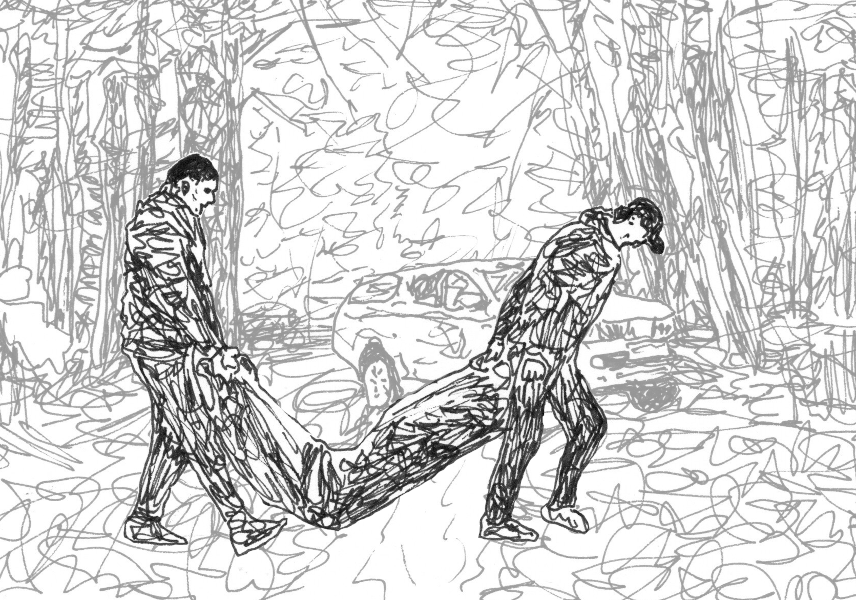 |
(Italiano) Come puoi descrivere quello che fanno i Ragazzi nella foresta? Scavano, trasportano qualcosa e poi ripartono. Non è facile per nessuno dei due, questo è certo, ma alla fine è la cosa migliore che possono fare nelle circostanze date. |
(Deutsch) Wie lässt sich beschreiben, was die Jungs da im Wald treiben? Nun, sie graben und dann tragen sie etwas und dann fahren sie wieder weg. Es fällt keinem von beiden leicht, so viel steht fest, aber am Ende ist es doch das Beste, was sie unter den gegebenen Umständen tun können. Normal Version | ||
2002 1 Heinz: Gottseidank ist es so kalt! |
2002 Heinz: Thank god it's so cold! |
2002 Heinz : Dieu merci, il fait si froid ! |
2002 Heinz: Grazie a Dio fa così freddo! |
2002 Heinz: ¡Gracias a Dios que hace tanto frío! |
2 Heinz: Nun kohomm! |
Heinz: Come on now! |
Heinz : Vas-y, vas-y ! |
Heinz: Vai, vai! |
Heinz: ¡Vamos, vamos! |
3 Helmut: Das war aber auch ne harte Nummer. |
Helmut: It was a tough one, that. |
Helmut : Ce n'était pas une mince affaire, quand même. |
Helmut: È stata dura, quella. |
Helmut: Fue duro, eso. |
4 Helmut: Könntest du jetzt bitte das Corpus Delicti heranholen, bevor die Polizei kommt? |
Helmut: Now could you please get the corpus delicti before the police come? |
Helmut : Maintenant, pourrais-tu s'il te plaît apporter le corps du délit avant que la police n'arrive ? |
Helmut: Ora, potresti portare il corpo del reato prima che arrivi la polizia? |
Helmut: Ahora, ¿podrías traer el cuerpo del delito antes de que llegue la policía? |
5 Helmut: Komm, hör auf jetzt! Hier, ich mach eine Räuberleiter. Oh Mann, deine Schuhe sind ja völlig matschig. |
Helmut: Come on, stop it now! Here, I'll give you a leg-up. Oh man, your shoes are all muddy. |
Helmut : Allez, arrête maintenant ! Tiens, je te fais la courte échelle. Oh mec, tes chaussures sont toutes boueuses. |
Helmut: Dai, smettila subito! Ecco, ti faccio la scaletta. Oh amico, le tue scarpe sono tutte infangate. |
Helmut: ¡Vamos, para ya! Toma, te hago de escalón con las manos. Tío, tienes los zapatos llenos de barro. |
6 Heinz: Nee, aber is schon okay die Aktion. |
Heinz: No, but this whole thing is okay. |
Heinz : Quand même, c'est plutôt correct, cette action. |
Heinz: No, ma va bene questa azione. |
Heinz: No, pero está bien, esta acción. |
(English) Negril in Jamaica is a wonderful place and the Boys deserve a vacation. When they've had enough of the beach, they explore the surroundings and have a unique experience, each in his own way. |
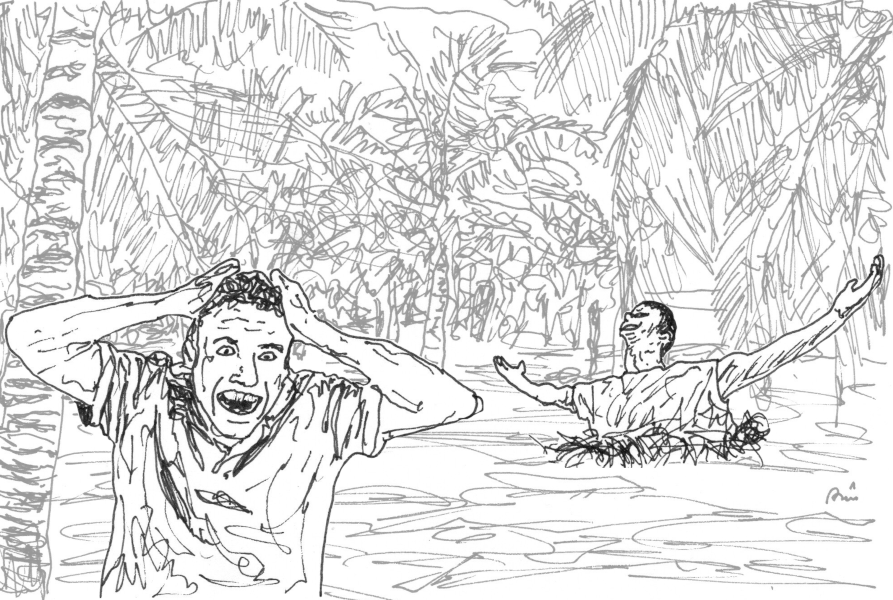 |
(Italiano) Negril, in Giamaica, è un luogo meraviglioso e i Ragazzi meritano una vacanza. Quando ne hanno abbastanza della spiaggia, esplorano il territorio e vivono un'esperienza unica, ognuno a modo suo. |
(Deutsch) Negril auf Jamaika ist ein wunderbarer Ort und die Jungs haben einen Urlaub verdient. Als sie vom Strand genug haben, erkunden sie die Umgebung und machen eine einmalige Erfahrung, jeder auf seine Art. Normal Version | ||
2002 1 Helmut: Karibik total! |
2002 Helmut: Absolutely Caribbean! |
2002 Helmut : Caraïbes total ! |
2002 Helmut: Caraibi totale! |
2002 Helmut: ¡Caribe total! |
2 Helmut: Ja nee, is schon gut. Hey, komm, lass uns aufstehen und die Gegend erkunden! Sonst gammeln wir noch fest am Strand. |
Helmut: Yeah, no, it's okay. Hey, come on, let's get up and explore the area! Otherwise we'll get stuck on the beach. |
Helmut : Oui non, laisse tomber. Allez, on se lève et on va explorer la région ! Sinon, nous allons pourrir sur la plage. |
Helmut: Sì, no, va bene. Ehi, forza, alziamoci ed esploriamo la zona! Altrimenti ci ritroveremo a marcire sulla spiaggia. |
Helmut: Sí, no, está bien. Eh, venga, ¡levantémonos y exploremos la zona! Si no, nos pudriremos en la playa. |
3 Helmut: Kuck doch mal, all die ganzen Schmetterlinge! |
Helmut: Look at all the butterflies! |
Helmut : Regarde tous ces papillons ! |
Helmut: Guarda quante farfalle! |
Helmut: ¡Mira qué mariposas! |
4 Heinz: Hier unten bin ich. |
Heinz: I am down here. |
Heinz : Me voilà en bas. |
Heinz: Sono qui sotto. |
Heinz: Estoy aquí abajo. |
5 Heinz: Es kribbelt. |
Heinz: It's tingling. |
Heinz : Ça picote. |
Heinz: Mi pizzica tutto. |
Heinz: Siento un hormigueo. |
6 Heinz: Du, Helmut? |
Heinz: Helmut? |
Heinz : Helmut ? |
Heinz: Helmut? |
Heinz: ¿Helmut? |
(English) Back in Germany, the two have a stopover in Munich, where it is strangely quiet. When Helmut sees the boutique of the famous fashion designer Moshammer from the cab, he is beside himself with excitement. The real Moshammer! With his Daisy! |
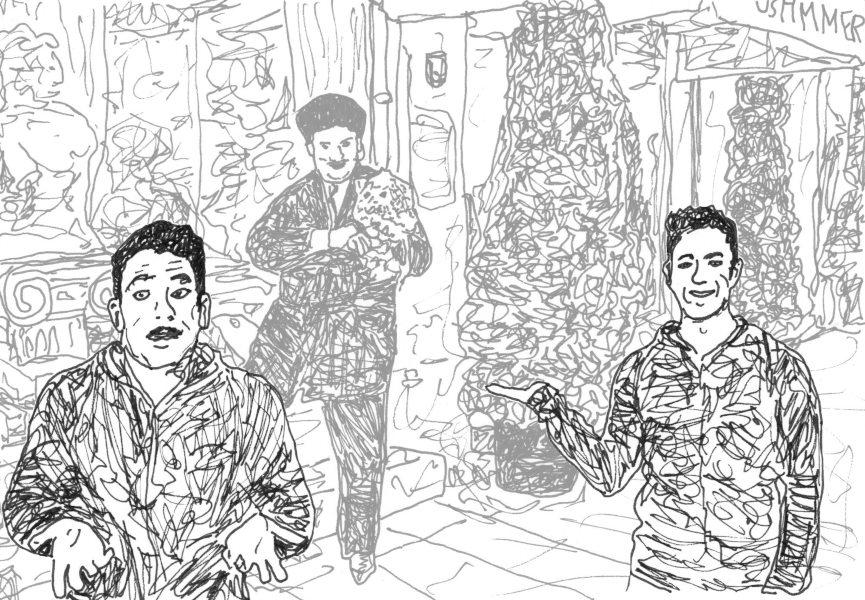 |
(Italiano) Tornati in Germania, i due fanno una sosta a Monaco, dove c'è una strana tranquillità. Quando Helmut scorge dal taxi la boutique del famoso stilista Moshammer, è fuori di sé dall'eccitazione. Il vero Moshammer! Con la sua Daisy! |
(Deutsch) Zurück in Deutschland haben die beiden einen Zwischenstopp in München, wo es seltsam ruhig ist. Als Helmut die Boutique des bekannten Modeschöpfers Moshammer aus dem Taxi erblickt, gerät er aus dem Häuschen. Der echte Moshammer! Mit der Daisy! Normal Version | ||
2002 1 Heinz: Was hast du denn der Stewardess noch alles zu erzählen gehabt? |
2002 Heinz: What was all this you told the flight attendant? |
2002 Heinz : Qu'est-ce que tu avais encore à dire à l'hôtesse de l'air ? |
2002 Heinz: Che cosa hai detto alla hostess? |
2002 Heinz: ¿Qué fue todo eso que le dijiste a la azafata? |
2 Helmut: Und wie lange haben wir jetzt Aufenthalt in München? |
Helmut: And how long do we have to stay in Munich now? |
Helmut : Et combien de temps devons-nous rester à Munich maintenant ? |
Helmut: E per quanto tempo dovremo rimanere a Monaco adesso? |
Helmut: ¿Y cuánto tiempo tenemos que quedarnos ahora en Múnich? |
3 Helmut: Klar! Hey, Moshammer! |
Helmut: Sure! Hey, Moshammer! |
Helmut : Bien sûr ! Hé, Moshammer ! |
Helmut: Certo! Ehi, Moshammer! |
Helmut: ¡Claro! ¡Eh, Moshammer! |
4 Helmut: Hier! Hier ist sein Laden! Der bekannte Modeschöpfer mit der Daisy und allem. |
Helmut: Here! This is his store! The famous fashion designer with his Daisy and everything. |
Helmut : Tiens ! C'est sa boutique ! Le célèbre créateur de mode avec sa Daisy et tout le reste. |
Helmut: Qui! Questo è il suo negozio! Il famoso stilista con la sua Daisy e tutto il resto. |
Helmut: ¡Aquí! ¡Aquí está su tienda! El famoso diseñador de moda con su Daisy y todo. |
5 Heinz: Helmut, reiß dich zusammen! |
Heinz: Helmut, pull yourself together! |
Heinz : Helmut, ressaisis-toi ! |
Heinz: Helmut, riprenditi! |
Heinz: ¡Helmut, contrólate! |
6 Helmut: Und hier hinten! Heinz! Komm doch mal durch! |
Helmut: And over there! Heinz. Come on through! |
Helmut : Et là-bas ! Heinz ! Passe donc par là ! |
Helmut: E laggiù! Heinz. Vieni di là! |
Helmut: ¡Y allí! ¡Heinz! ¿Por qué no pasas? |
7 Helmut: Kuck mal, Heinz, den Mantel! Sie, Herr Moshammer, wieviel kostet der? |
Helmut: Look, Heinz, this coat! Herr Moshammer, how much is that one? |
Helmut : Regarde, Heinz, ce manteau ! Herr Moshammer, combien coûte-t-il ? |
Helmut: Guarda, Heinz, questo cappotto! Herr Moshammer, quanto costa questo? |
Helmut: ¡Mira, Heinz, este abrigo! Herr Moshammer, ¿cuánto cuesta? |
8 Helmut: Ey, jetzt hör auf! Was soll denn der Mann hier von uns denken? |
Helmut: Hey, stop it! What is this gentleman supposed to think of us? |
Helmut : Arrête, maintenant ! Qu'est-ce que ce monsieur va penser de nous ? |
Helmut: Ora basta! Cosa penserà di noi questo signore? |
Helmut: ¡Ya basta! ¿Qué pensará este señor de nosotros? |
(English) Where aren't these Boys roaming? Here they are in Jerusalem, however they may have gotten there. It is not very difficult for them to adopt the local customs and traditions. |
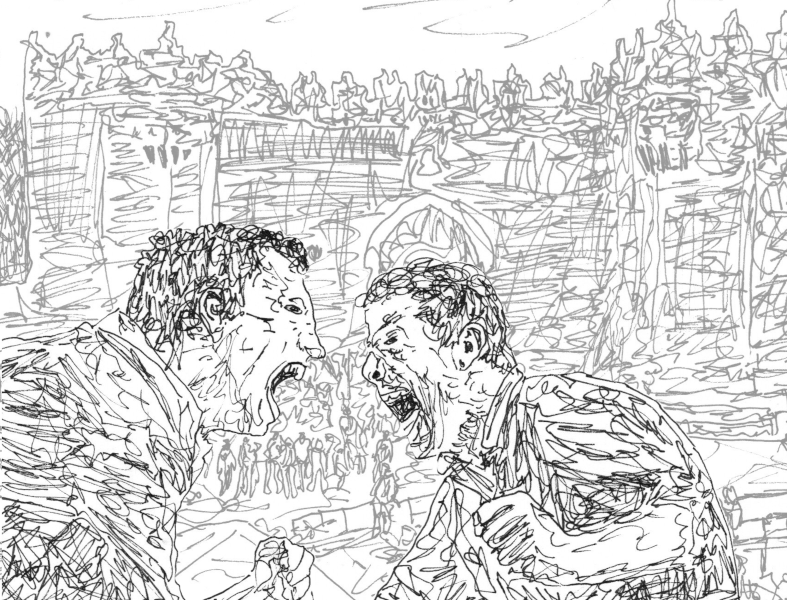 |
(Italiano) Ovunque i Ragazzi si trovino! Ora sono a Gerusalemme, in qualunque modo siano arrivati. Non è difficile per loro adottare gli usi e i costumi locali. |
(Deutsch) Wo sich die Jungs überall herumtreiben! Nun sind sie in Jerusalem, wie auch immer sie dort hingekommen sein mögen. Es fällt ihnen nicht schwer, die dortigen Sitten und Gebräuche zu übernehmen. Normal Version | ||
2002 1 Heinz: Also, ich finde es ziemlich anstrengend, gleich schon wieder zu verreisen. |
2002 Heinz: You know, I find it rather exhausting to go traveling again so soon. |
2002 Heinz : Tu sais, je trouve que c'est plutôt épuisant de repartir en voyage si tôt. |
2002 Heinz: Sai, penso che sia piuttosto faticoso ricominciare a viaggiare così presto. |
2002 Heinz: Bueno, me parece bastante agotador volver a viajar enseguida. |
2 Helmut: Es ist jetzt Zwölf. Der Kontaktmann müsste jeden Moment hier aufkreuzen. Vorausgesetzt, dies ist wirklich das Damaskustor. |
Helmut: It's twelve now. The contact guy should show up any moment now, given that this is indeed the Damascus Gate. |
Helmut : Il est midi maintenant. Le contact va se montrer d'un moment à l'autre. En supposant que ce soit vraiment la porte de Damas. |
Helmut: Sono le dodici in punto. L'uomo di contatto dovrebbe arrivare da un momento all'altro. Supponendo che questa sia davvero la Porta di Damasco. |
Helmut: Ya son las doce. El hombre de contacto debería aparecer por aquí en cualquier momento. Suponiendo que esto sea realmente la Puerta de Damasco. |
3 Helmut: Da! Jetzt hat er dem Soldaten eins in die Fresse gehauen. Das gibt Ärger. |
Helmut: There! Now he punched the soldier in the face. That'll mean big trouble. |
Helmut : Voilà, maintenant il a mis un coup de poing dans la gueule du soldat. Ça va faire des histoires. |
Helmut: Ecco! Ora ha dato un pugno in faccia al soldato. Ci saranno problemi. |
Helmut: ¡Ahí! Ahora le ha dado un puñetazo en la cara al soldado. Va a haber problemas. |
4 Heinz: Mann, der Typ kam da vorbei, und der andere hat ihn angehalten und provoziert. |
Heinz: Man, this guy came along there and the other guy stopped and provoked him. |
Heinz : Mec, le gars est passé par là, et l'autre l'a arrêté et provoqué. |
Heinz: Amico, il ragazzo è andato da quella parte e l'altro lo ha fermato e lo ha provocato. |
Heinz: Tío, el tipo se fue por ahí y el otro le paró y le provocó. |
5 Heinz: Es gibt hier noch mehr Steine. Aaaau! Lass mich ... |
Heinz: There are even more stones here. Ouch! Let me... |
Heinz : Il y a bien d'autres pierres ici. Aïe ! Laisse-moi... |
Heinz: Ci sono ancora più pietre qui. Ahi! Lasciami... |
Heinz: Aquí hay aún más piedras. ¡Ay! Déjame... |
6 Helmut: Ey, ich hau dir den ... |
Helmut: Man, I hit you in the... |
Helmut : Mec, je t'ai frappé dans le... |
Helmut: Amico, ti ho dato un calcio nel... |
Helmut: Amigo, te he dado una patada en el... |
7 Helmut: Ja, so. Aaah, meine ... |
Helmut: That's right. Aaah, my... |
Helmut : Oui, comme ça. Aaah, mes... |
Helmut: Sì, così. Aaah, le mie... |
Helmut: Sí, así. Aaah, mis... |
(English) What's wrong with Helmut? When he returns home from a visit to his parents, Heinz has plenty to do to bring his friend back to the present. |
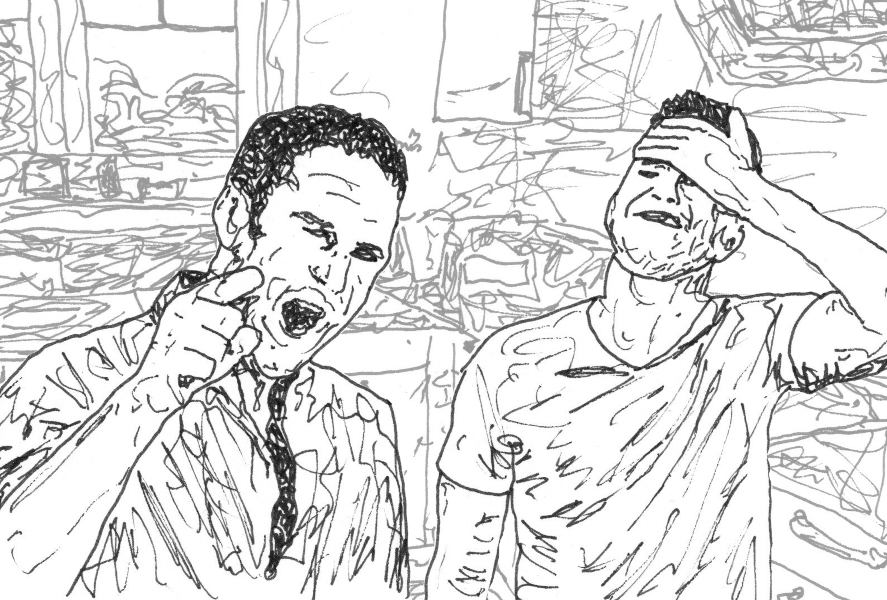 |
(Italiano) Cosa c'è che non va in Helmut? Quando torna a casa dopo una visita ai suoi genitori, Heinz ha il suo bel da fare per riportare l'amico nel presente. |
(Deutsch) Was ist denn mit Helmut los? Als er von einem Besuch von seinen Eltern nach Hause zurückkommt, hat Heinz alle Hände voll damit zu tun, seinen Freund in die Gegenwart zu holen. Normal Version | ||
2002 1 Heinz: Und, wie war's? |
2002 Heinz: So how was it? |
2002 Heinz : Alors, comment c'était ? |
2002 Heinz: Allora, com'è andata? |
2002 Heinz: ¿Y cómo fue? |
2 Heinz: Mensch, ich hab doch nur gefragt ... |
Heinz: Man, I only asked... |
Heinz : Mec, je n'ai fait que demander. |
Heinz: Amico, ho solo chiesto... |
Heinz: Tío, solo he preguntado... |
3 Heinz: Komm, jetzt stell dich nicht so an. Du wolltest es selbst in den Mülleimer werfen. |
Heinz: Come on, don't make a fuss about it. You wanted to throw it in the garbage yourself. |
Heinz : Allez, n'en fais pas tout un plat. Tu voulais le jeter toi-même à la poubelle. |
Heinz: Dai, non farne un dramma. Tu stesso volevi gettarlo nella spazzatura. |
Heinz: Venga, no armes jaleo. Tú mismo querías tirarlo a la basura. |
4 Helmut: Mann, wieso immer gegen mich? Erst die ganzen Nervereien, dann die lange Fahrt. Die Klimaanlage funktioniert auch nicht. Dann ist man froh, endlich wieder zu Hause zu sein ... |
Helmut: Man, why always against me? First all this trouble, then the long journey... the air-conditioning didn't work, either. Then one is happy to finally be back home... |
Helmut : Mec, pourquoi toujours contre moi ? D'abord tous ces ennuis, puis le long voyage... la climatisation ne fonctionnait pas non plus. Ensuite, on est heureux d'être enfin de retour à la maison... |
Helmut: Amico, perché sempre contro di me? Prima tutti gli assilli, poi il lungo viaggio. Anche l'aria condizionata non funziona. Poi sono contento di essere finalmente a casa... |
Helmut: Tío, ¿por qué siempre estás en mi contra? Primero todas las broncas, luego el largo viaje. El aire acondicionado tampoco funciona. Luego me alegro de estar por fin en casa... |
5 Helmut: Was soll das heißen: Wenn ich nicht darüber reden will? Wer sagt denn das? |
Helmut: What do you mean: if I don't wanna talk about it? Who said that? |
Helmut : Comment ça, si je ne veux pas en parler ? Qui dit ça ? |
Helmut: Cosa intendi con "se non vuoi parlarne"? Chi ha detto questo? |
Helmut: ¿Cómo que si no quiero hablar de ello? ¿Quién ha dicho eso? |
6 Helmut: Kuck mal, was du für Sachen zu mir sagst. „Idiot” und „Penner” und „Halt die Klappe” ... |
Helmut: Look! See what you're saying to me: "idiot" and "nut" and "shut up your face"... |
Helmut : Regarde ce que tu me dis. « Idiot » et « Espèce de cinglé » et « ferme-la »... |
Helmut: Guarda! Vedi cosa mi stai dicendo? "sciocco" e "cazzone" e "chiudi il becco"... |
Helmut: Mira las cosas que me dices. "tonto" y "chiflado" y "cállate"... |
7 Heinz: Wo hast du das denn her? |
Heinz: And where did you pick up that one? |
Heinz : Et où as-tu appris ça ? |
Heinz: E dove l'hai presa questa? |
Heinz: ¿De dónde has sacado eso? |
(English) On Sunday morning of all mornings, the boiler breaks down and it's cold. Very cold. While Helmut fixes things up in the cellar, he talks to Heinz about various topics of the time. |
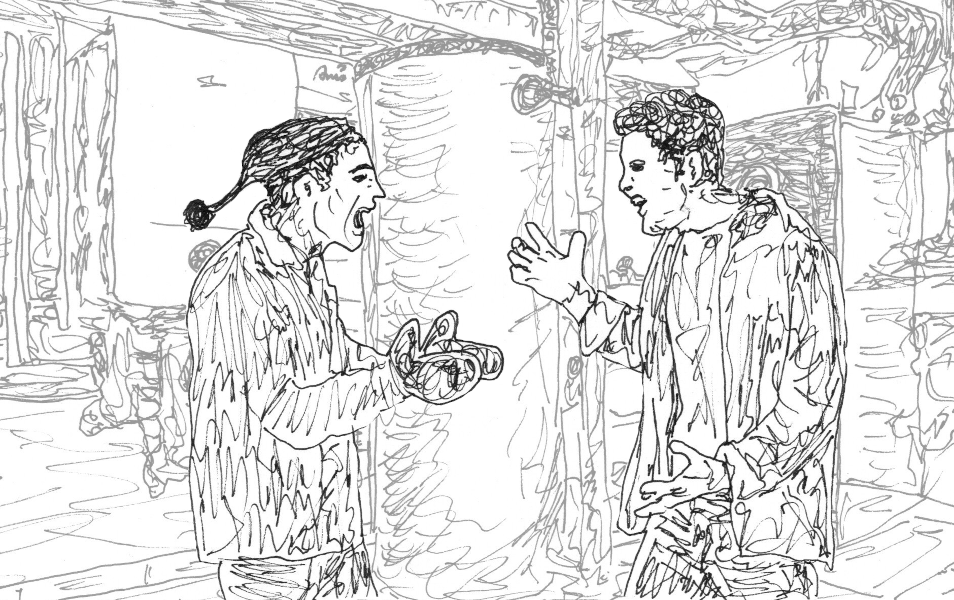 |
(Italiano) La domenica mattina di tutte le mattine, la caldaia si rompe e fa freddo. Molto freddo. Mentre Helmut ripara le cose in cantina, parla con Heinz di varie questioni attuali. |
(Deutsch) Ausgerechnet am Sonntagmorgen geht der Heizkessel kaputt und es ist kalt. Sehr kalt. Während Helmut die Sache im Keller in Ordnung bringt, unterhält er sich mit Heinz über verschiedene Themen der Zeit. Normal Version | ||
Korrekt 2002 1 Heinz: Oh Gott, ist das kalt hier! Helmuuuuut!! |
2002 Heinz: Oh God, it's so cold in here! Helmuuuuuut!!! |
2002 Heinz : Oh mon Dieu, il fait si froid ici ! Helmuuuuut !!! |
2002 Heinz: Oh Dio, fa così freddo qui dentro! Helmuuuuuut!!! |
2002 Heinz: ¡Oh Dios, qué frío hace aquí! ¡¡¡Helmuuuuuut!!! |
2 Helmut: Ey sag mal! Bist du blöd? Solche Vergleiche macht man nicht. |
Helmut: Hey! Are you stupid? We don't make comparisons like that. |
Helmut : Hé ! Tu es stupide ? On ne fait pas de comparaisons comme ça. |
Helmut: Ehi! Sei stupido? Non si fanno paragoni così. |
Helmut: ¡Eh, dime! ¿Eres tonto? No se hacen comparaciones así. |
3 Helmut: So, nun wollen wir uns mal diesen bescheuerten Heizkessel ankucken! |
Helmut: So, now let's have a look at this stupid boiler! |
Helmut : Alors, jetons un coup d'il à cette stupide chaudière ! |
Helmut: Allora, diamo un'occhiata a questa stupida caldaia! |
Helmut: ¡Bueno, echemos un vistazo a esa estúpida caldera! |
4 Helmut: Sei mal eben ruhig! Wo kommt denn auf einmal das ganze Wasser her? |
Helmut: Shut up for a minute, will you? Where is all this water coming from all of a sudden? |
Helmut : Tais-toi une minute, tu veux bien ? D'où vient toute cette eau tout d'un coup ? |
Helmut: Stai zitto un attimo, ti dispiace? Da dove viene tutta quest'acqua all'improvviso? |
Helmut: Cállate un momento, ¿quieres? ¿De dónde sale toda esta agua de repente? |
5 Helmut: Ja, du weißt schon, wen ich meine. Man sagt dieses Wort nicht, sonst wird man gleich verdächtig, ein Dings zu sein. |
Helmut: Yes, you know who I mean. People don't say that word, otherwise they immediately suspect you of being a gizmo. |
Helmut : Oui, tu sais de qui je parle. On ne dit pas ce mot, sinon on est tout de suite soupçonné d'être un de ceux-là. |
Helmut: Sì, sai a chi mi riferisco. Non devi pronunciare quella parola, altrimenti sei subito sospettato di essere uno di loro. |
Helmut: Sí, ya sabes a quién me refiero. No digas esa palabra, de lo contrario serás inmediatamente sospechoso de ser uno de ellos. |
6 Helmut: Ja genau! Es war einfach zu schlimm damals. |
Helmut: Yes, exactly! It was just too bad back then. |
Helmut : Oui, c'est ça ! C'était tout simplement trop grave à l'époque. |
Helmut: Sì, esattamente! Era troppo brutto all'epoca. |
Helmut: ¡Sí, exactamente! Era demasiado malo entonces. |
7 Helmut: Nee, bloß nicht! Lieber über Ally Macbeal. |
Helmut: No, by all means! I'd rather talk about Ally Macbeal. |
Helmut : Non, pas du tout ! Je préfère parler d'Ally Macbeal. |
Helmut: No, per niente! Preferisco parlare di Ally Macbeal. |
Helmut: ¡No, por supuesto! Prefiero hablar de Ally Macbeal. |
(English) Helmut celebrates Western civilization after having heard the news. Heinz lets him finish before offering him an alternative view, which his friend can't get past. |
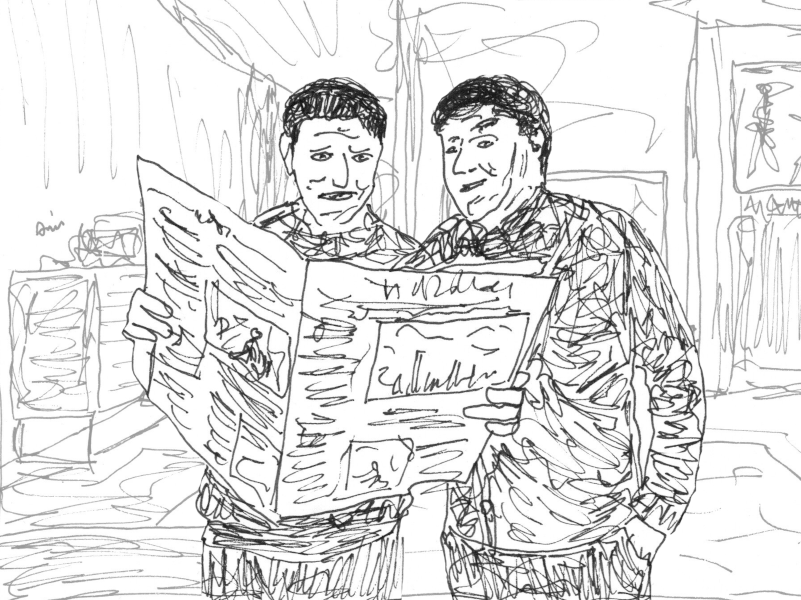 |
(Italiano) Helmut celebra la civiltà occidentale dopo aver ascoltato il telegiornale. Heinz lo lascia finire prima di offrirgli una visione alternativa, che l'amico non riesce a ignorare. |
(Deutsch) Helmut feiert die westliche Zivilisation, nachdem er die Nachrichten gehört hat. Heinz lässt ihn ausreden, bevor er ihm eine alternative Sichtweise anbietet, an der sein Freund nicht vorbeikommt. Normal Version | ||
ist gefallen 10.04.2003 1 Heinz: Hi Helmut! |
has Fallen 10.04.2003 Heinz: Hi Helmut! |
10.04.2003 Heinz : Salut Helmut ! |
10.04.2003 Heinz: Ciao Helmut! |
10.04.2003 Heinz: ¡Hola Helmut! |
2 Heinz: Hast du dich also wieder identifiziert? |
Heinz: So you've identified with people again, huh? |
Heinz : Tu t'es donc identifié à nouveau, je suppose ? |
Heinz: Quindi ti sei identificato di nuovo, suppongo? |
Heinz: ¿Así que te has identificado de nuevo, supongo? |
3 Helmut: Doch! Bagdad ... Wiege der Zivilisation, jetzt bist du unser. Endlich! Orientalischer Kleinod ... äh, Heinz heißt das eigentlich „der Kleinod” oder „das Kleinod”? |
Helmut: Yes it does, Baghdad... Cradle of civilization, now you're ours. At last! Oriental gem... uh, or is that the word for bacillus? |
Helmut : Si, Bagdad... Berceau de la civilisation, maintenant tu es à nous. Enfin ! Gemme orientale... euh, ou est-ce le mot pour la graine ? |
Helmut: Ma sì, Baghdad... Culla della civiltà, ora sei nostra. Finalmente! Gemma orientale... o è la parola che indica il seme? |
Helmut: Pero sí, Bagdad... Cuna de la civilización, ahora eres nuestra. ¡Por fin! Gema oriental... ¿o esa es la palabra para semilla? |
4 Helmut: Ach ja? Hier! Dann kuck mal, was die Zeitung hier auf Seite eins titelt. Na? |
Helmut: Oh yeah? Here! Then take a look at the headline on page one of today's newspaper. Well? |
Helmut : Ah oui ? Tiens ! Alors regarde ce que le journal titre ici en première page d'aujourd'hui. Alors ? |
Helmut: Ah sì? Ecco! Guarda il titolo del giornale di oggi a pagina uno. Allora? |
Helmut: ¿Ah, sí? Toma. Entonces echa un vistazo al titular de la primera página del periódico de hoy. ¿Y bien? |
5 Helmut: Bagdad, Damaskus, Jerusalem, endlich ist es wieder unser! |
Helmut: Baghdad, Damascus, Jerusalem, at last it's ours again! |
Helmut : Bagdad, Damas, Jérusalem, enfin de nouveau à nous ! |
Helmut: Baghdad, Damasco, Gerusalemme, finalmente sono di nuovo nostre! |
Helmut: Bagdad, Damasco, Jerusalén, ¡por fin vuelven a ser nuestras! |
6 Heinz: Kannst du jetzt bitte mit diesem Scheiß aufhören? |
Heinz: Can you please stop with this shit now? |
Heinz : Tu pourrais arrêter de dire de la merde maintenant, s'il te plaît ? |
Heinz: Puoi smetterla con queste stronzate, per favore? |
Heinz: ¿Puedes dejar esta mierda ya, por favor? |
7 Helmut: Du willst es mir nicht gerade leicht machen, hab ich recht? |
Helmut: You're not trying to make it easy for me, am I right? |
Helmut : Tu ne veux pas me faciliter les choses, j'ai raison ? |
Helmut: Non stai cercando di rendermi le cose facili, vero? |
Helmut: No intentas ponérmelo fácil, ¿verdad? |
(English) Helmut has found a new job, long-term, stable and well paid. So why is Heinz so upset about it? Someone understand these Boys! |
 |
(Italiano) Helmut ha trovato un nuovo lavoro, a lungo termine, stabile e ben pagato. Allora perché Heinz è così arrabbiato? Bisogna capire questi Ragazzi! |
(Deutsch) Helmut hat einen neuen Job gefunden, langfristig, stabil und gut bezahlt. Warum also regt sich Heinz dermaßen darüber auf? Verstehe einer die Jungs! Normal Version | ||
Helmut 2003 1 Heinz: Ach, da bist du ja wieder. Hey, hast du das Auto gesehen, das da vor der Tür steht? |
Helmut 2003 Heinz: Ah, you're back. Hey, have you seen the car that's parked in front of the door? |
2003 Heinz : Ah, te revoilà. Hé, tu as vu la voiture qui est garée devant la porte ? |
2003 Heinz: Ah, sei tornato. Ehi, hai visto la macchina parcheggiata fuori dalla porta? |
2003 Heinz: Ah, has vuelto. Oye, ¿has visto el coche que está aparcado delante de la puerta? |
2 Helmut: Pass doch auf! Da liegen überall Kabel rum. |
Helmut: Watch out! There are cables everywhere. |
Helmut : Attention ! Il y a des câbles partout. |
Helmut: Attenzione! Ci sono cavi ovunque. |
Helmut: ¡Cuidado! Hay cables por todas partes. |
3 Helmut: Nö. Ich hatte ja schon länger diese Kontakte, naja, und jetzt habe ich mich bewährt. |
Helmut: Nope. I've had these contacts for a while, well, and now I've proven myself. |
Helmut : Non. J'avais déjà ces contacts depuis quelque temps, eh bien, et maintenant j'ai fait mes preuves. |
Helmut: No. Ho già avuto questi contatti per un po' di tempo, beh, e ora ho dimostrato il mio valore. |
Helmut: No. Hace tiempo que tengo estos contactos, bueno, y ahora he demostrado mi valía. |
4 Helmut: Ja, von der Nasa. Pass auf, setz dich nicht auf die Unterlagen da. |
Helmut: Yes, by Nasa. Be careful, don't sit on the documents there. |
Helmut : Oui, par la Nasa. Attention, ne t'assieds pas sur ces documents. |
Helmut: Sì, dalla Nasa. Attento, non sederti su quei documenti. |
Helmut: Sí, por la NASA. Cuidado, no te sientes sobre esos documentos. |
5 Heinz: Helmut, mir gefällt die Richtung nicht, in die das geht. Nimm mal bitte diese Sonnenbrille ab. Das ist ja nicht auszuhalten! |
Heinz: Helmut, I don't like the direction this is going. Please take off those sunglasses. This is unbearable! |
Heinz : Helmut, je n'aime pas la direction que cela prend. Enfin, enlève ces lunettes de soleil, s'il te plaît. C'est insupportable ! |
Heinz: Helmut, non mi piace la direzione che sta prendendo. Per favore, togliti quegli occhiali da sole. È insopportabile! |
Heinz: Helmut, no me gusta el rumbo que está tomando esto. Por favor, quítate esas gafas de sol. ¡Es insoportable! |
6 Helmut: Den haben die mir nicht gegeben. Den habe ich mir selbst besorgt. Ist ein gebrauchter. Ich habe den günstig von den Engländern gekriegt. |
Helmut: They didn't give it to me. I got it myself. It's a used one. I got it cheap from the Brits. |
Helmut : Ils ne me l'ont pas donnée. Je l'ai achetée moi-même. C'est une occasion. Je l'ai eue pour pas cher chez les Anglais. |
Helmut: Non me l'hanno data. L'ho comprata io stesso. È di seconda mano. L'ho presa a poco prezzo dagli inglesi. |
Helmut: No me lo dieron. Lo conseguí yo mismo. Es de segunda mano. Me lo dieron barato los ingleses. |
7 Helmut: Wir haben eine veränderte Sicherheitslage. |
Helmut: We have a changed security situation. |
Helmut : Nous avons une situation de sécurité modifiée. |
Helmut: La situazione di sicurezza è cambiata. |
Helmut: La situación de seguridad ha cambiado. |
(English) The first appearance of the Gals! Fiona tells her friend Fanni about the worrying developments in her boyfriend Heinz's apartment, which he shares with Helmut. |
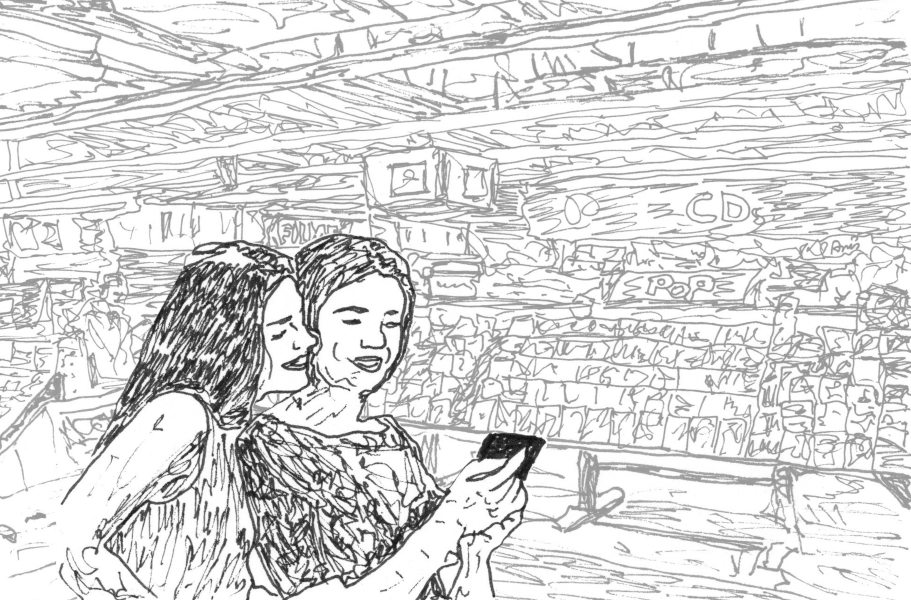 |
(Italiano) La prima apparizione delle Ragazze! Fiona racconta alla sua amica Fanni dei preoccupanti sviluppi nell'appartamento del suo ragazzo Heinz, che condivide con Helmut. |
(Deutsch) Der erste Auftritt der Mädels! Fiona erzählt ihrer Freundin Fanni von den beunruhigenden Entwicklungen in der Wohnung ihres Freunds Heinz, die er sich mit Helmut teilt. Normal Version | ||
Fanni und Fiona 2003 1 Fiona: Fanni, kuck ma, da drüben läuft Heinz! |
Fanni and Fiona 2003 Fiona: Fanni, look, Heinz is running over there! |
Fanni et Fiona 2003 Fiona : Fanni, regarde, c'est Heinz là-bas ! |
Fanni e Fiona 2003 Fiona: Fanni, guarda, quello laggiù è Heinz! |
2003 Fiona: ¡Fanni, mira, Heinz está ahí! |
2 Fanni: Wieso gehst du nicht einfach hin? |
Fanni: Why don't you just go over there? |
Fanni : Pourquoi tu n'y vas pas ? |
Fanni: Perché non vai lì? |
Fanni: ¿Por qué no vas allí? |
3 Fanni: Und wieso? |
Fanni: And why? |
Fanni : Et pourquoi ? |
Fanni: E perché? |
Fanni: ¿Y por qué? |
4 Fanni: Oh, kuck mal die Jacke da. Na da im Schaufenster! |
Fanni: Oh, look at that jacket! There in the shop window! |
Fanni : Oh, regarde cette veste ! Là, dans la vitrine ! |
Fanni: Oh, guarda quella giacca! Lì, in vetrina! |
Fanni: ¡Oh, mira esa chaqueta! ¡Ahí, en el escaparate! |
5 Fanni: Dieser Helmut ist schon schräg. |
Fanni: This Helmut is really weird. |
Fanni : Ce Helmut est vraiment bizarre. |
Fanni: Questo Helmut è davvero strano. |
Fanni: Este Helmut es muy raro. |
6 Fiona: Du, Fanni? |
Fiona: Fanni? |
Fiona : Fanni ? |
Fiona: Fanni? |
Fiona: ¿Fanni? |
(English) At Helmut's request, the two meet on Kiel beach, where Heinz reproaches his friend, despite the beautiful view and the nature around them. For the sake of peace, Helmut finally makes some constructive suggestions. |
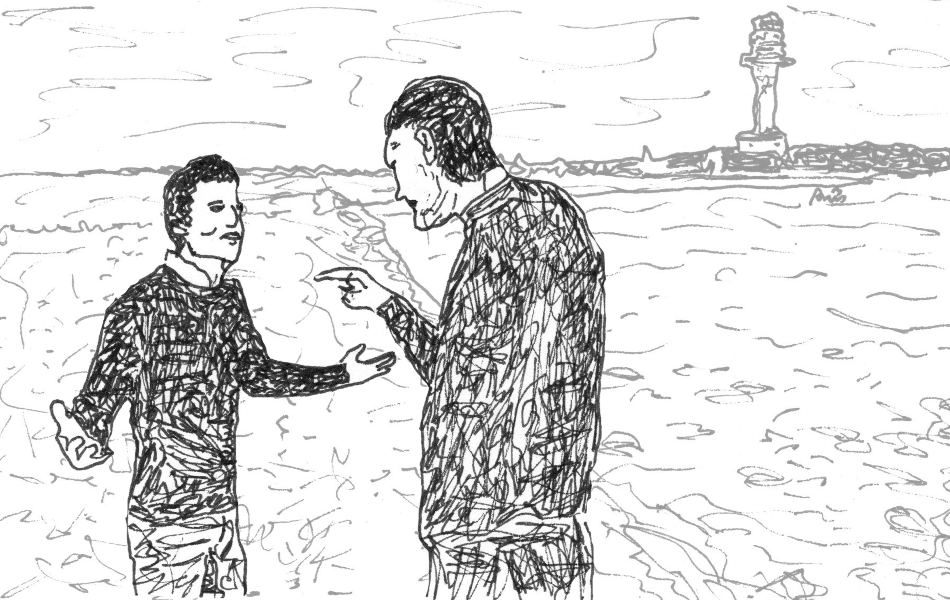 |
(Italiano) Su richiesta di Helmut, i due si incontrano sulla spiaggia di Kiel, dove Heinz rimprovera l'amico, nonostante il bel panorama e la natura che li circonda. Per amore della pace, Helmut finalmente dà qualche suggerimento costruttivo. |
(Deutsch) Auf Helmuts Wunsch treffen sich die beiden am Kieler Strand, wo Heinz seinem Freund Vorhaltungen macht, trotz der schönen Aussicht und der Natur um sie herum. Um des Friedens willen macht Helmut schließlich einige konstruktive Vorschläge. Normal Version | ||
2003 1 Heinz: Das kann ja wohl alles nicht dein Ernst sein! |
2003 Heinz: All this can't be serious! |
Le Débat 2003 Heinz : Tout ça ne peut pas être sérieux ! |
2003 Heinz: Tutto questo non può essere serio! |
La Discusión 2003 Heinz: ¡Todo esto no puede ser serio! |
2 Helmut: Ja, das wechselt. Letzte Woche waren es die Polen und nächste Woche die Engländer und danach die Niederländer. Wir haben Schleswig-Holstein in Sektoren aufgeteilt und hier sind heute die Dänen dran. |
Helmut: Yes, that changes. Last week it was the Poles and next week the English and then the Dutch. We have divided Schleswig-Holstein into sectors and today it's the turn of the Danes here. |
Helmut : Oui, ça change. La semaine dernière, c'était les Polonais et la semaine prochaine, les Anglais et ensuite les Hollandais. Nous avons divisé le Schleswig-Holstein en secteurs et ici, aujourd'hui, c'est le tour des Danois. |
Helmut: Sì, cambia. La settimana scorsa erano i polacchi, la prossima gli inglesi e poi gli olandesi. Abbiamo diviso lo Schleswig-Holstein in settori e oggi è il turno dei danesi. |
Helmut: Sí, eso cambia. La semana pasada fueron los polacos y la semana que viene los ingleses y luego los holandeses. Hemos dividido Schleswig-Holstein en sectores y hoy les toca a los daneses aquí. |
3 Heinz: Bei mir hat die Abschreckung schon funktioniert. Ich gehe. |
Heinz: For me, the deterrence has already worked. I'm off. |
Heinz : Pour moi, la dissuasion a déjà fonctionné. Je m'en vais. |
Heinz: Per quanto mi riguarda, la deterrenza ha già funzionato. Me ne vado. |
Heinz: Por lo que a mí respecta, la disuasión ya ha funcionado. Me voy. |
4 Heinz: Oh Helmut, das fliegt alles auf, Mann. |
Heinz: Oh Helmut, it's all going to come out, man. |
Heinz : Oh Helmut, tout ça va se savoir, mec. |
Heinz: Oh Helmut, verrà fuori tutto, amico. |
Heinz: Oh Helmut, todo esto va a salir a la luz, tío. |
5 Heinz: Ja, außer dem Auto. |
Heinz: Yeah, except for the car. |
Heinz : Oui, à part la voiture. |
Heinz: Sì, a parte la macchina. |
Heinz: Sí, excepto el coche. |
(English) Helmut has received mail and brags about it to Heinz. However, Heinz has also received mail and suddenly Helmut's good mood is gone. Then he finds out some details that make him prick up his ears. |
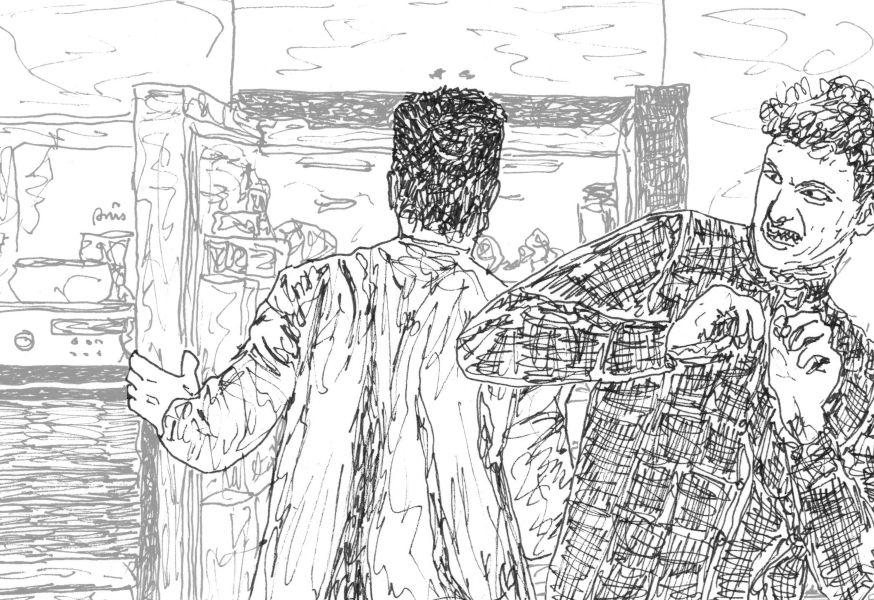 |
(Italiano) Helmut ha ricevuto della posta e se ne vanta con Heinz. Tuttavia, anche lui ha ricevuto della posta e improvvisamente il buon umore di Helmut viene meno, fino a quando non viene a conoscenza di alcuni dettagli che gli fanno drizzare le orecchie. |
(Deutsch) Helmut hat Post bekommen und prahlt damit vor Heinz. Der hat allerdings auch Post bekommen und plötzlich ist Helmuts gute Laune dahin, bis er einige Details erfährt, die ihn hellhörig machen. Normal Version | ||
2008 1 Heinz: Also Helmut, nun bin ich schon froh ... |
2008 Heinz: Well Helmut, now I am glad... |
2008 Heinz : Eh bien Helmut, maintenant je suis content... |
2008 Heinz: Bene Helmut, ora sono contento... |
2008 Heinz: Bueno Helmut, ahora me alegro... |
2 Heinz: Na ja, passt ja ganz gut, wo wir sowieso wegziehen. |
Heinz: Well, that's handy, since we are moving away anyway. |
Heinz : Eh bien, ça tombe bien, puisque nous déménageons de toute façon. |
Heinz: Beh, è comodo, visto che ci stiamo trasferendo comunque. |
Heinz: Bueno, eso es conveniente, ya que de todas formas nos estamos mudando. |
3 Helmut: Siehste, da bewegt sich nichts. |
Helmut: You see, nothing is moving. |
Helmut : Tu vois, rien ne bouge. |
Helmut: Vedi, non si muove nulla. |
Helmut: Ya ves, no se mueve nada. |
4 Helmut: ... Sie als Referenten beim Naturbund willkommen heißen zu können ... bla ... Öffentlichkeitsarbeit ... bla ... ab nächstem Erstem ... Waaaas?!? |
Helmut: ...to be able to welcome you as a speaker at the Naturbund... blah... public relations... blah... starting the first of next... Whaaaat?!? |
Helmut : ...de pouvoir vous accueillir comme référent au Naturbund... bla... relations publiques... bla... à partir du premier du mois prochain... Quoiiiii ?!? |
Helmut: ...per accoglierLa come addetto al Naturbund... bla... pubbliche relazioni... bla... a partire dal prossimo primo... Cosaaaa?!? |
Helmut: ...para darle la bienvenida como empleado de Naturbund... bla... relaciones públicas... bla... a partir del primero del año que viene... ¿¡¿Quéééé!?! |
5 Helmut: Mainz, wie grauenhaft. |
Helmut: Mainz, how horrible. |
Helmut : Mayence, quelle horreur. |
Helmut: Mainz, che orrore. |
Helmut: Maguncia, qué horror. |
(English) The exhaust has a hole in it. Fortunately, Heinz has met a trustworthy mechanic at the wine market. In his garage, however, Helmut gets distracted and ventures into dangerous territory. |
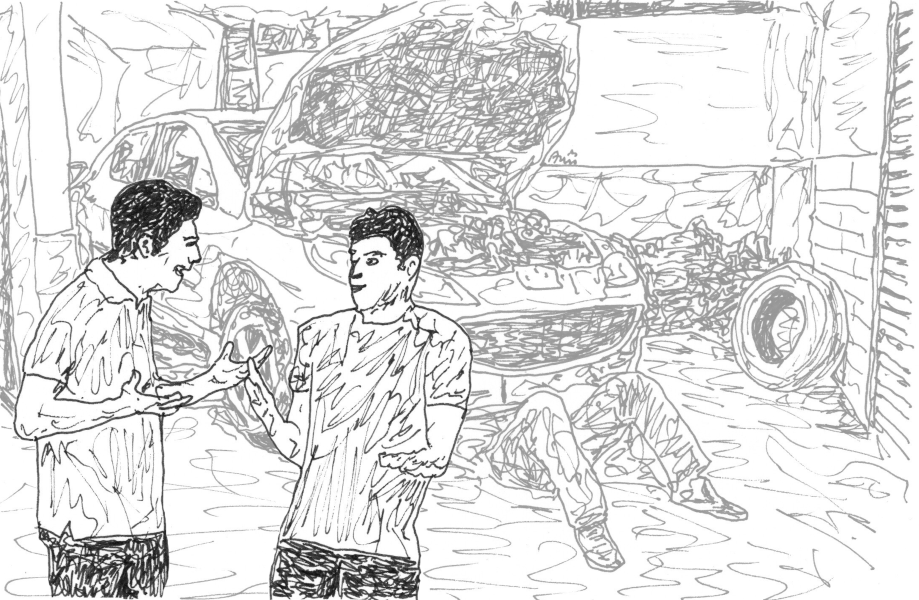 |
(Italiano) Lo scarico ha un buco. Fortunatamente, Heinz ha incontrato un meccanico di fiducia al mercato del vino. Nel suo garage, però, Helmut si distrae ed entra in sfere pericolose. |
(Deutsch) Der Auspuff hat ein Loch. Zum Glück hat Heinz auf dem Weinmarkt einen vertrauenswürdigen Mechaniker kennengelernt. In seiner Autowerkstatt allerdings wird Helmut abgelenkt und begibt sich in gefährliche Sphären. Normal Version | ||
2010 1 Helmut: Heinz für Mainz ... Mainzer Heinz ... |
2010 Helmut: Heinz for Mainz... Mainzian Heinz... |
2010 Helmut : Hayence pour Mayence... Heinz à Mainz... |
2010 Helmut: Heinz per Mainz... Haionza di Magonza... |
2010 Helmut: Heinz de Mainz... Mainz por Heinz... |
2 Helmut: Und wo hast du diesen Mechaniker-Hasen noch mal kennengelernt? |
Helmut: And where did you meet this hustler mechanic again? |
Helmut : Et où as-tu rencontré ce mécanicien agaçant, déjà ? |
Helmut: E dove hai incontrato questo meccanico assassino? |
Helmut: ¿Y dónde conociste a este mecánico así o asá? |
3 Helmut: Ist er das da unter dem BMW? |
Helmut: Is that him under the BMW? |
Helmut : C'est lui, là, sous la BMW ? |
Helmut: È lui sotto la BMW? |
Helmut: ¿Es él, ahí, debajo del BMW? |
4 Helmut: Können wir nicht der Braut auch unseren Auspuff zeigen? |
Helmut: Can't we show the chick our exhaust as well? |
Helmut : On ne peut pas aussi montre notre pot d'échappement à la meuf ? |
Helmut: Non possiamo mostrare il nostro tubo di scarico anche alla sventola? |
Helmut: ¿No podemos enseñarle también a la tía nuestro tubo de escape? |
5 Heinz: Was? Oh, Scheiße. Er hat sich den Schraubenschlüssel gegriffen. |
Heinz: What? Oh, shit. He grabbed the wrench. |
Heinz : Quoi ? Oh, merde. Il a attrapé la clé à molette. |
Heinz: Cosa? Oh, merda. Ha preso la chiave inglese. |
Heinz: ¿Qué? Mierda. Ha cogido la llave inglesa. |
6 Heinz: Du bist so ein Idiot. |
Heinz: You are such an idiot. |
Heinz : Tu es vraiment un idiot. |
Heinz: Sei proprio un idiota. |
Heinz: Eres idiota. |
(English) Heinz wants to put up the shower curtain and drills into a power line. When Helmut finds him electrified like that, he is glad that his friend can still talk, even though they immediately start arguing. |
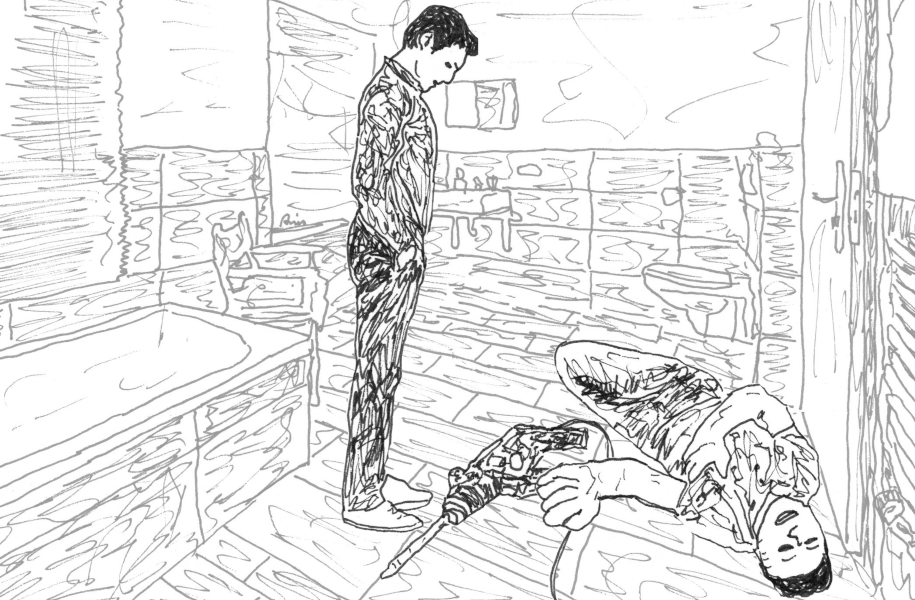 |
(Italiano) Heinz vuole montare la tenda della doccia e trapana una linea di corrente forte. Quando Helmut lo trova così elettrificato, è contento che il suo amico riesca ancora a parlare, anche se i due iniziano subito a litigare. |
(Deutsch) Heinz will den Duschvorhang anbringen und bohrt dabei auf eine Starkstromleitung. Als Helmut ihn so elektrisiert vorfindet, ist er froh, dass sein Freund noch reden kann, auch wenn sie gleich zu streiten anfangen. Normal Version | ||
Starkstrom 2011 1 Helmut: Hallo! ... Äh, wieso geht denn das Licht nicht? Heinz? Bist du da? Haaheinz! |
2011 Helmut: Hello! ... Uh, why doesn't the light work? Heinz? Are you there? Haaheinz! |
Courant fort 2011 Helmut : Salut ! ...Euh, pourquoi la lumière ne fonctionne pas ? Heinz ? Tu es là ? Haaheinz ! |
2011 Helmut: Ciao! ...Ehm, perché la luce non funziona? Heinz? Ci sei? Haaheinz! |
2011 Helmut: ¡Hola! ...Eh, ¿por qué no funciona la luz? ¿Heinz? ¿Estás ahí? ¡Haaheinz! |
2 Helmut: Oh Gott, Heinz, was ist denn hier los? Geht's dir gut? |
Helmut: Oh God, Heinz, what's going on here? Are you alright? |
Helmut : Oh mon Dieu, Heinz, qu'est-ce qui se passe ici ? Tu vas bien ? |
Helmut: Oddio, Heinz, cosa sta succedendo? Stai bene? |
Helmut: Oh Dios, Heinz, ¿qué está pasando aquí? ¿Te encuentras bien? |
3 Heinz: Bin wohl ein wenig groggy, aber geht schon. |
Heinz: I guess I'm a little groggy, but I'm okay. |
Heinz : Je suis un peu groggy, mais ça va. |
Heinz: Mi sento un po' intontito, ma sto bene. |
Heinz: Probablemente estoy un poco aturdido, pero estoy bien. |
4 Helmut: Du redest wirr. Nimm lieber eine Tablette. |
Helmut: You're talking confused. Better take a pill. |
Helmut : Tu divagues. Tu ferais mieux de prendre une pilule. |
Helmut: Stai vaneggiando. È meglio che tu prenda una pillola. |
Helmut: Estás divagando. Mejor tómate una pastilla. |
5 Heinz: Protest, alles klar. Andere nennen es „die aggressive Phase des Herrn Helmut”. |
Heinz: Protest, all right. Others call it "the aggressive phase of Mr. Helmut". |
Heinz : Protestation, bien sûr. D'autres appellent cela « la phase agressive de Monsieur Helmut ». |
Heinz: Protesta, certo. Altri la chiamano "la fase aggressiva del signor Helmut". |
Heinz: Protesta, de acuerdo. Otros lo llaman "la fase agresiva del Sr. Helmut". |
6 Heinz: Kannst ja am Montag mit auf die Demo kommen. |
Heinz: You can join us at the demonstration on Monday. |
Heinz : Pourquoi tu ne viens pas à la manifestation de lundi ? |
Heinz: Perché non vieni alla manifestazione di lunedì con noi? |
Heinz: Puedes unirte a nosotros en la manifestación del lunes. |
7 Heinz: Was machen wir jetzt mit dem Loch in der Wand? |
Heinz: What are we going to do with the hole in the wall now? |
Heinz : Qu'est-ce qu'on fait maintenant avec le trou dans le mur ? |
Heinz: Cosa facciamo ora con il buco nel muro? |
Heinz: ¿Qué vamos a hacer ahora con el agujero en la pared? |
(English) Amazing how quickly Fanni gets to know people! Fiona talks to her about it when she comes to Fanni's party and they chat in the kitchen, where it's not so noisy. There Fanni makes a discovery that gives her some ideas. |
 |
(Italiano) È incredibile quanto velocemente Fanni riesca a conoscere le persone! Fiona gliene parla quando viene alla festa di Fanni e chiacchierano in cucina, dove non c'è tanto rumore. Lì, Fanni fa una scoperta che le dà qualche idea. |
(Deutsch) Erstaunlich, wie schnell Fanni Leute kennenlernt! Fiona spricht sie darauf an, als sie zu Fannis Party kommt und sie sich in der Küche unterhalten, wo es nicht so laut ist. Dabei macht Fanni eine Entdeckung, die sie auf Ideen bringt. Normal Version | ||
2011 1 Fiona: Hi Fanni! Und, läuft die Party schon? |
2011 Fiona: Hi Fanni! So, has the party started yet? |
2011 Fiona : Salut Fanni ! Alors, la fête a déjà commencé ? |
2011 Fiona: Ciao Fanni! Allora, la festa è già iniziata? |
2011 Fiona: ¡Hola Fanni! ¿Ya ha empezado la fiesta? |
2 Fiona: Du bist unglaublich. |
Fiona: You are unbelievable. |
Fiona : Tu es incroyable. |
Fiona: Sei incredibile. |
Fiona: Eres increíble. |
3 Fanni: Ja komm, ich hab' alles Mögliche da. |
Fanni: Yeah sure, I've got all kinds of stuff. |
Fanni : Oui, viens, j'ai tout ce qu'il faut. |
Fanni: Sì, certo, ho un sacco di roba. |
Fanni: Sí, vamos, tengo todo lo que necesito. |
4 Fiona: Wir können ja mal drüben fragen, ob ihn jemand kennt. |
Fiona: We can ask the others if anyone knows him. |
Fiona : Nous pouvons demander aux autres si quelqu'un le connaît. |
Fiona: Possiamo chiedere agli altri se qualcuno lo conosce. |
Fiona: Podemos preguntar a los demás si alguien le conoce. |
5 Fiona: Und? |
Fiona: Well? |
Fiona : Et alors ? |
Fiona: E allora? |
Fiona: ¿Y bien? |
6 Fanni: Weißt du, Nora, er hat ziemlich miese Sachen über dich gesagt. |
Fanni: You know, Nora, he said some pretty bad things about you. |
Fanni : Tu sais, Nora, il a dit des choses assez méchantes sur toi. |
Fanni: Sai, Nora, ha detto delle cose piuttosto spiacevoli su di te. |
Fanni: Sabes, Nora, ha dicho cosas muy feas de ti. |
(English) Anyone who has ever toyed with the idea of swimming across the Rhine from Mainz to Wiesbaden in fine weather should read the following report before putting on their swimming trunks. Or swimsuits, for that matter. |
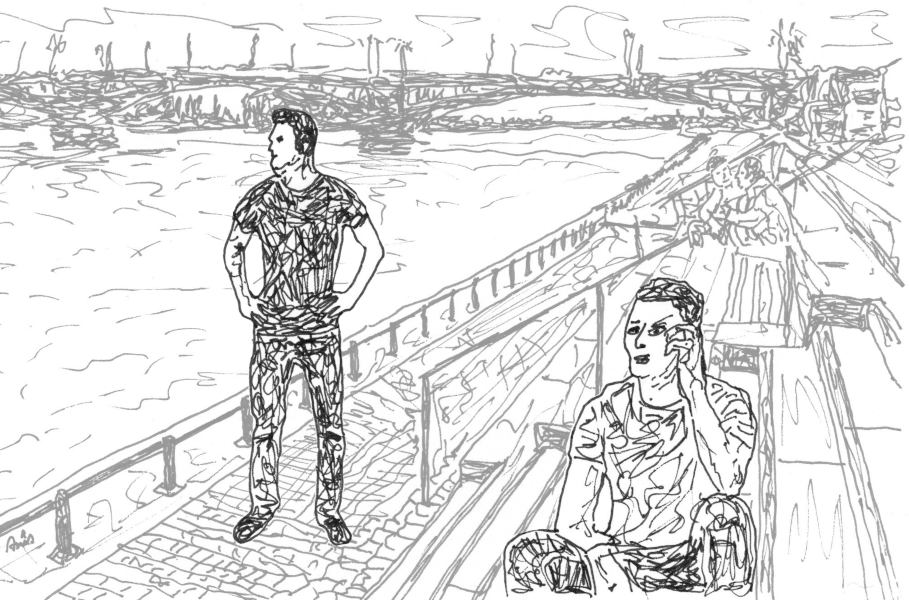 |
(Italiano) Chiunque abbia mai accarezzato l'idea di attraversare a nuoto il Reno da Magonza a Wiesbaden con il bel tempo dovrebbe leggere il seguente resoconto prima di indossare il costume da bagno. |
(Deutsch) Wer jemals mit dem Gedanken gespielt hat, bei schönem Wetter quer durch den Rhein von Mainz nach Wiesbaden zu schwimmen, sollte sich erst einmal den folgenden Bericht durchlesen, bevor er oder sie sich die Badehose anzieht. Oder den Badeanzug. Normal Version | ||
2011 1 Helmut: Der Sommer ist zurückgekommen. Kuck mal die da! |
2011 Helmut: Summer has come back. Oh, look at her! |
2011 Helmut : L'été est revenu. Oh, regarde celle-là ! |
2011 Helmut: L'estate è tornata. Oh, guarda questa! |
2011 Helmut: Ha vuelto el verano. Oh, ¡mira esta! |
2 Helmut: Wie wäre es mit einem erfrischenden Bad? Einmal ans andere Ufer und zurück. |
Helmut: How about a refreshing swim? To the other shore and back. |
Helmut : Que dirais-tu d'une baignade rafraîchissante ? Jusqu'à l'autre rive et retour. |
Helmut: Che ne dici di una nuotata rinfrescante? Fino all'altra sponda e ritorno. |
Helmut: ¿Qué tal un baño refrescante? Hasta la otra orilla y vuelta. |
3 Helmut: Ausziehn! Ausziehn! Ja also, geht doch. Oh. |
Helmut: Undress! Undress! There you go. Oh. |
Helmut : Déshabille-toi ! Déshabille-toi ! Voilà, c'est bon. Oh. |
Helmut: Spogliati! Spogliati! Ecco fatto. Oh. |
Helmut: ¡Desvístete! ¡Desvístete! Eso es. Oh. |
4 Helmut: So witzig finde ich das gar nicht. Ist doch anders als damals im Baggersee. |
Helmut: I don't think it's that funny. It's not the same as in the quarry pond back then. |
Helmut : Je ne trouve pas ça si drôle. C'est quand même différent de l'époque de la gravière. |
Helmut: Non credo sia così divertente. Non è come nel laghetto della cava di ghiaia di allora. |
Helmut: A mí no me hace tanta gracia. Es un poco diferente de los días del lago de la cantera. |
5 Heinz: Was sollen wir jetzt machen? |
Heinz: What are we supposed to do now? |
Heinz : Qu'est-ce qu'on va faire maintenant ? |
Heinz: Cosa facciamo adesso? |
Heinz: ¿Qué hacemos ahora? |
6 Heinz: Kraul kraul kraul |
Heinz: Crawl crawl crawl |
Heinz : Crawl crawl crawl |
Heinz: Crawl crawl crawl |
Heinz: Crol, crol, crol |
(English) When Heinz returns from a seminar, he finds the apartment in a desolate state. Helmut tells his friend about his new job, but Heinz doesn't seem too enthusiastic about the direction Helmut's life is taking. |
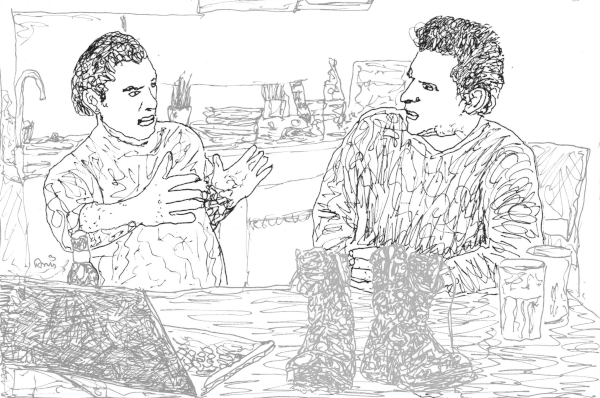 |
(Italiano) Quando Heinz torna da un seminario, trova l'appartamento in uno stato desolato. Helmut racconta all'amico del suo nuovo lavoro, ma Heinz non sembra molto entusiasta della direzione che sta prendendo la vita di Helmut. |
(Deutsch) Als Heinz von einem Seminar zurückkehrt, findet er die Wohnung in einem desolaten Zustand vor. Helmut erzählt seinem Freund von seiner neuen Arbeitsstelle, doch so richtig begeistert scheint Heinz von der Richtung, in die sich Helmuts Leben bewegt, nicht zu sein. Normal Version | ||
2011 1 Helmut: Home, sweet home. Oh, Heinz, du? Ich habe erst am Abend mit dir gerechnet. |
2011 Helmut: Home, sweet home. Oh, Heinz, you here? I wasn't expecting you until the evening. |
2011 Helmut : Home, sweet home. Oh, Heinz, toi ? Je ne t'attendais pas avant le soir. |
2011 Helmut: Casa, dolce casa. Oh, Heinz, sei qui? Non ti aspettavo prima di sera. |
2011 Helmut: Home, sweet home. Oh, Heinz, ¿tú? No te esperaba hasta la noche. |
2 Helmut: Aha! Jetzt kommen wir der Sache schon näher. |
Helmut: Ah! Now were are getting closer to the point, aren't we? |
Helmut : Ah ! Maintenant, on se rapproche du cur du sujet, je suppose. |
Helmut: Ah! Ora ci stiamo avvicinando al punto, vero? |
Helmut: ¡Ah! Ahora nos acercamos al tema, ¿no? |
3 Heinz: Bei welchen Truppen? |
Heinz: With which troops? |
Heinz : Avec quelles troupes ? |
Heinz: Quali truppe? |
Heinz: ¿Qué tropas? |
4 Heinz: Und was sollst du für ihn machen? |
Heinz: And what are you supposed to do for him? |
Heinz : Et qu'est-ce que tu es censé faire pour lui ? |
Heinz: E cosa dovresti fare per lui? |
Heinz: ¿Y qué se supone que tienes que hacer por él? |
5 Helmut: Quatsch, bist du verrückt? Du, sag bitte nichts gegen Obama, solange Franklin hier ist. |
Helmut: Nonsense, are you mad? Heinz, please don't say anything against Obama as long as Franklin is here. |
Helmut : C'est absurde, tu es fou ? Heinz, s'il te plaît, ne dis rien contre Obama tant que Franklin est là. |
Helmut: È assurdo, sei impazzito? Heinz, per favore, non dire nulla contro Obama mentre Franklin è qui. |
Helmut: Absurdo, ¿estás loco? Heinz, por favor, no digas nada contra Obama mientras Franklin esté aquí. |
6 Heinz: Du beeindruckst mich immer wieder, Helmut. |
Heinz: You do have a way of impressing me time and time again, Helmut. |
Heinz : Tu as l'art de m'impressionner encore et encore, Helmut. |
Heinz: Riesci a stupirmi sempre di più, Helmut. |
Heinz: Tienes una forma de impresionarme una y otra vez, Helmut. |
7 Helmut: Endlich habe ich wieder einen Job! Die zahlen ja ein Schweinegeld, die Amis. |
Helmut: Finally I have a new job now! And they pay buckets of cash, the Yanks. |
Helmut : J'ai enfin un nouveau travail ! Et ils paient à la pelle, les Yankees. |
Helmut: Finalmente ho un nuovo lavoro! E pagano un sacco di soldi, gli yankee. |
Helmut: ¡Por fin tengo un nuevo trabajo! Y pagan un pastón, los yanquis. |
8 Helmut: Ja ja, Ausreden, wie üblich. Deshalb müssen wir ja etwas unternehmen. |
Helmut: Of course, excuses, like always. This is why we got to do something about it. |
Helmut : Oui, oui, des excuses, comme d'habitude. C'est pour ça qu'il faut faire quelque chose. |
Helmut: Sì, sì, scuse, come al solito. Ecco perché dobbiamo fare qualcosa. |
Helmut: Sí, sí, excusas, como siempre. Por eso tenemos que hacer algo. |
(English) Helmut's new working environment puts a strain on the boys' domestic peace. To smooth things over, Heinz agrees to have a talk in Frankfurt, but it can't be said that he has an easy time of it, even though Helmut accompanies him. |
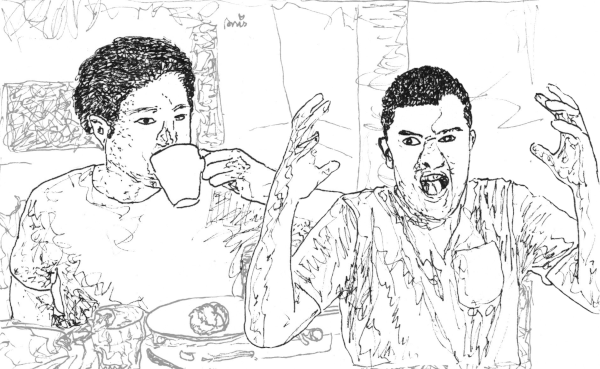 |
(Italiano) Il nuovo ambiente di lavoro di Helmut mette a dura prova la pace domestica dei ragazzi. Per appianare le cose, Heinz accetta di fare una chiacchierata a Francoforte, ma non si può dire che per lui sia facile, anche se Helmut lo accompagna. |
(Deutsch) Helmuts neue Arbeitsumgebung belastet den häuslichen Frieden bei den Jungs. Um die Wogen zu glätten erklärt sich Heinz bereit, ein Gespräch in Frankfurt zu führen, aber man kann nicht sagen, dass es ihm leichtfällt, auch wenn Helmut ihn begleitet. Normal Version | ||
Die Einladung 2013 1 Helmut: Wow, Franklin hat uns noch frische Brötchen gebracht, bevor er weg ist. Mmh, warme Spitzweck! |
The Invitation 2013 Helmut: Wow, Franklin brought us fresh rolls before he left. Mmh, warm spitzweck rolls! |
L'Invitation 2013 Helmut : Wow, Franklin nous a apporté des petits pains frais avant de partir. Mmh, des spitzweck chauds ! |
L'Invito 2013 Helmut: Wow, Franklin ci ha portato dei panini freschi prima di andarsene. Mmh, spitzweck caldi! |
La Invitación 2013 Helmut: Vaya, Franklin nos trajo panecillos recién hechos antes de irse. Mmh, ¡panecillos spitzweck caliente! |
2 Helmut: Mann, das ist eine Kooperation zwischen den Streitmächten und der Bundeswehr. Da sollte man sich nicht einmischen. |
Helmut: Man, this is a cooperation between the armed forces and the Bundeswehr. One shouldn't interfere with that. |
Helmut : Mec, c'est une coopération entre les forces armées et la Bundeswehr. Il ne faut pas se mêler de ça. |
Helmut: Amico, questa è una collaborazione tra le forze armate e la Bundeswehr. Non ci si dovrebbe immischiare. |
Helmut: Tío, eso es una cooperación entre las fuerzas armadas y el Bundeswehr. No deberías interferir en eso. |
3 Helmut: Tja, da hat wohl jemand eine unvorsichtige Email geschrieben ... |
Helmut: Well, someone must have written a careless email... |
Helmut : Eh bien, quelqu'un a dû écrire un e-mail imprudent... |
Helmut: Beh, qualcuno deve aver scritto un'email sbadata... |
Helmut: Bueno, alguien debió de escribir un correo electrónico descuidado... |
4 Helmut: Ja, das kannst du dann dem Richter erzählen. |
Helmut: Yes, you can tell that to the judge. |
Helmut : Oui, tu pourras dire ça au juge. |
Helmut: Sì, puoi dirlo al giudice. |
Helmut: Sí, puedes decírselo al juez. |
5 Heinz: Das fehlt mir noch. |
Heinz: That's all I need. |
Heinz : Il ne manquait plus que ça. |
Heinz: Non ci mancava che questo! |
Heinz: Eso es todo lo que necesito. |
6 Heinz: Ey, der Typ wohnt hier und jetzt soll ich bis zum Flughafen raus, um mit ihm zu reden? |
Heinz: Hey, the guy lives here and I have to go all the way to the airport to talk to him? |
Heinz : Hé, le type habite ici et maintenant je dois sortir jusqu'à l'aéroport pour lui parler ? |
Heinz: Ehi, il tizio sta qui e io devo andare fino all'aeroporto per parlargli? |
Heinz: Eh, ¿el tipo se aloja aquí y tengo que ir hasta el aeropuerto para hablar con él? |
7 Heinz: Ich kann ja meinen Laptop mitnehmen, falls er weitere Infos braucht. |
Heinz: Well, I could bring my laptop along, in case he needs more information. |
Heinz : Je pourrais apporter mon portable, au cas où il aurait besoin de plus d'informations. |
Heinz: Beh, potrei portare con me il mio portatile, nel caso avesse bisogno di ulteriori informazioni. |
Heinz: Bueno, podría llevarme mi portátil, por si necesitas más información. |
(English) Helmut is sorry that Heinz missed his anniversary with Fiona because of the unexpected conversation in Frankfurt. He tries to encourage him by giving him an expensive present for her, which almost succeeds. |
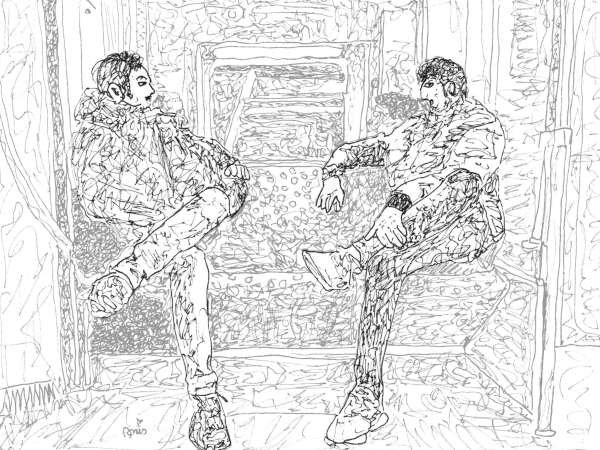 |
(Italiano) Helmut è dispiaciuto che Heinz abbia perso il suo anniversario con Fiona a causa di quella conversazione inaspettata a Francoforte. Vuole incoraggiarlo dandogli un regalo costoso per lei, cosa che quasi gli riesce. |
(Deutsch) Es tut Helmut leid, dass Heinz seinen Jahrestag mit Fiona wegen des unerwarteten Gesprächs in Frankfurt verpasst hat. Mit einem teuren Geschenk für sie will er ihm Mut machen, was auch beinahe gelingt. Normal Version | ||
In der S-Bahn 21.10.2023 1 Heinz: Lass doch mal sehen, das Bein. |
On the Train 2023 Heinz: Let me see your leg. |
Dans le Train 2023 Heinz : Fais-moi voir ta jambe. |
In Treno 2023 Heinz: Fammi vedere la gamba. |
En el Ferrocarril 2023 Heinz: Déjame ver tu pierna. |
2 Helmut: Jetzt hör aber auf! Mann, du hast eine Art Absolution bekommen. Bloß die Warterei war nervig, bis er endlich da war. |
Helmut: Give me a break! Man, you received some kind of absolution. Only the waiting was annoying until he finally arrived. |
Helmut : Arrête un peu ! Mec, tu as reçu une sorte d'absolution. Seule l'attente était ennuyeuse jusqu'à ce qu'il arrive enfin. |
Helmut: Ma fammi il piacere! Amico, hai ottenuto una sorta di assoluzione. Solo l'attesa è stata fastidiosa finché non è arrivato. |
Helmut: ¡Dame un respiro! Tío, recibiste una especie de absolución. Solo la espera fue molesta hasta que por fin llegó. |
3 Heinz: Unglaublich. Und dass er dieses riesige Büro mitten im Flughafen hat! |
Heinz: Unbelievable. And then he has this huge office in the middle of the airport! |
Heinz : Incroyable. Et qu'il ait cet énorme bureau au milieu de l'aéroport ! |
Heinz: Incredibile. E che avesse un ufficio enorme nel bel mezzo dell'aeroporto! |
Heinz: Increíble. ¡Y que tenga esa enorme oficina en medio del aeropuerto! |
4 Helmut: Ich habe einen raffinierten Plan! |
Helmut: I have a cunning plan! |
Helmut : J'ai un plan astucieux ! |
Helmut: Ho un piano astuto! |
Helmut: ¡Tengo un plan astuto! |
5 Helmut: Jedenfalls war er ziemlich beeindruckt davon, dass du den Termin nicht verlegen wolltest. |
Helmut: Anyway, he was pretty impressed that you didn't want to reschedule. |
Helmut : En tout cas, il a été assez impressionné par le fait que tu ne veuilles pas reporter le rendez-vous. |
Helmut: Comunque, è rimasto piuttosto colpito dal fatto che tu non abbia voluto rimandare l'incontro. |
Helmut: De todos modos, le impresionó bastante que no quisieras aplazar la cita. |
6 Helmut: Hey, kuck mal, wer da gerade eingestiegen ist! |
Helmut: Hey, look who just walked in! |
Helmut : Hé, regarde qui vient de monter ! |
Helmut: Ehi, guarda chi è appena salita! |
Helmut: ¡Eh, mira quién acaba de subir! |
7 Heinz: Obwohl sie groß gekocht und ein paar Freunde von auswärts eingeladen hatte. |
Heinz: Even though she had made a huge dinner and invited a couple of friends from out of town. |
Heinz : Même si elle avait préparé un énorme dîner et invité quelques amis de l'extérieur. |
Heinz: Anche se aveva preparato una cena enorme e invitato alcuni amici da fuori città. |
Heinz: A pesar de que había preparado una cena enorme e invitado a unos cuantos amigos de fuera de la ciudad. |
8 Heinz: Seufz, OK, tief durchatmen. Alles wird wieder gut. Durchs Fenster schauen: Aha, drittletzte Station. Ein geschlossener Kiosk, paar Leute auf dem Bahnsteig, Helmut und die schwarze Witwe ... |
Heinz: Sigh, OK, take a deep breath. Everything is going to be alright. A look through the window: Ah, third to last stop. A closed kiosk, some people on the platform, Helmut and the black widow... |
Heinz : Soupir, OK, respirer profondément. Tout ira bien. Regarder par la fenêtre : Ah, l'avant-avant-dernière station. Un kiosque fermé, quelques personnes sur le quai, Helmut et la veuve noire... |
Heinz: Sigh, OK, fai un respiro profondo. Andrà tutto bene. Uno sguardo attraverso il finestrino: Ah, l'antepenultima fermata. Un chiosco chiuso, alcune persone sulla piattaforma, Helmut e la vedova nera... |
Heinz: Suspiro, vale, respira hondo. Todo volverá a ir bien. Miro por la ventana: Ah, la antepenúltima estación. Un quiosco cerrado, unas cuantas personas en el andén, Helmut y la viuda negra... |
(English) When Fanni calls her friend and work colleague Fiona from a police station to ask her to feed her cats, Fiona is worried. After hearing Fanni's story, she not only learns that her worries are unfounded ... |
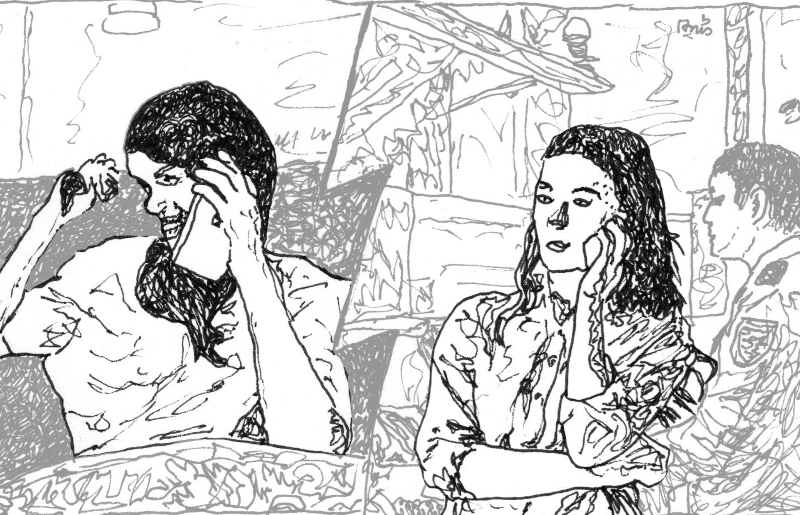 |
(Italiano) Quando Fanni chiama la sua amica e collega di lavoro Fiona da una stazione di polizia per chiederle di dare da mangiare ai suoi gatti, Fiona si preoccupa. Dopo aver ascoltato la storia di Fanni, scopre non solo che le sue preoccupazioni sono infondate... |
(Deutsch) Als Fanni ihre Freundin und Arbeitskollegin Fiona von einer Polizeiwache aus anruft, um sie zu bitten, ihre Katzen zu füttern, macht Fiona sich Sorgen. Nachdem sie dann Fannis Geschichte gehört hat, erfährt sie nicht nur, dass ihre Sorge unbegründet ist ... Normal Version | ||
2023 1 Fiona: Hallo? |
Call from Jail 2023 Fiona: Hello? |
2023 Fiona : Allô ? |
2023 Fiona: Pronto? |
2023 Fiona: ¿Diga? |
2 Fiona: Und wieso kann Prinzessin Fanni das nicht selbst tun? |
Fiona: And why can't Princess Fanni do that herself? |
Fiona : Et pourquoi la princesse Fanni ne peut-elle pas le faire elle-même ? |
Fiona: E perché la Principessa Fanni non può farlo da sola? |
Fiona: ¿Y por qué no puede hacerlo la princesa Fanni? |
3 Fiona: Ich glaube, das ist der bescheuertste Spruch, mit dem wir je Geld verdient haben. |
Fiona: I think that's the stupidest line we've ever made money with. |
Fiona : Je crois que c'est la phrase la plus stupide que nous ayons jamais faite pour gagner de l'argent. |
Fiona: Credo che sia la frase più stupida che abbiamo mai fatto per fare soldi. |
Fiona: Creo que es la frase más estúpida con la que hemos ganado dinero. |
4 Fiona: Was? Wer? Wohin? Wie? Was? |
Fiona: What? Who? Where? How? What? |
Fiona : Quoi ? Qui ? Où ? Comment ? Quoi ? |
Fiona: Cosa? Chi? Dove? Come? Cosa? |
Fiona: ¿Qué? ¿Quién? ¿Adónde? ¿Cómo? ¿Qué? |
5 Fiona: Fanni, wieso bist du im Knast? |
Fiona: Fanni, why are you in jail? |
Fiona : Fanni, pourquoi es-tu en prison ? |
Fiona: Fanni, perché sei in prigione? |
Fiona: Fanni, ¿por qué estás en la cárcel? |
6 Fiona: Wie gemein! Du hattest doch gar nichts gemacht, oder? |
Fiona: How mean! You hadn't done anything, had you? |
Fiona : Quelle méchanceté ! Tu n'as rien fait, n'est-ce pas ? |
Fiona: Che cattiveria! Non hai fatto nulla, vero? |
Fiona: ¡Qué mala leche! Tú no has hecho nada, ¿verdad? |
7 Fanni: Ach so, sag Wolfgang bitte, dass ich gegen Abend reinschaue und ihm von meiner aktuellen Akquise berichte. |
Fanni: Ah, please tell Wolfgang that I'll drop in around evening to tell him about my current client acquisition. |
Fanni : Ah, dis à Wolfgang que je passerai vers le soir pour lui parler de mon prospection en cours. |
Fanni: Ah, ti prego di dire a Wolfgang che passerò verso sera per parlargli della mia attuale prospezione. |
Fanni: Ah, por favor, dile a Wolfgang que me pasaré por la tarde para hablarle de mi actual captación de clientes. |
(English) After two weeks of radio silence, Heinz visits Helmut at the pond because there is a lot to talk about. While the fishing success leaves a good deal to be desired, the Boys at least manage to rekindle their friendship. |
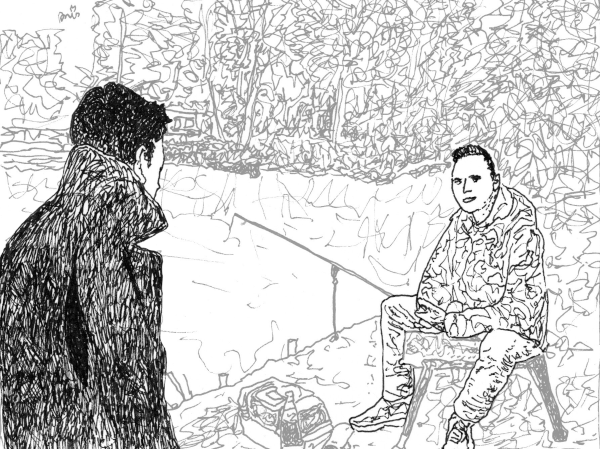 |
(Italiano) Dopo due settimane di silenzio radio, Heinz va a trovare Helmut al laghetto perché c'è molto di cui parlare. Anche se il successo della pesca lascia molto a desiderare, i Ragazzi riescono almeno a riaccendere la loro amicizia. |
(Deutsch) Nach zwei Wochen der Funkstille besucht Heinz Helmut am Teich, denn es gibt viel zu besprechen. Während der Angelerfolg zu wünschen übrig lässt, gelingt es den Jungs immerhin, einen Neubeginn ihrer Freundschaft einzuleiten. Normal Version | ||
2023 1 Helmut: Hallo, mein Lieber. |
2023 Helmut: Hello, dear friend. |
2023 Helmut : Bonjour, cher ami. |
2023 Helmut: Ciao, caro amico. |
2023 Helmut: Hola, querido amigo. |
2 Helmut: Nee, das ist nicht wegen sensibel. |
Helmut: No, it's not because of sensitive. |
Helmut : Non, ce n'est pas à cause de la sensibilité. |
Helmut: No, non è perché sono sensibile. |
Helmut: No, no es porque sea sensible. |
3 Helmut: Du musst von vorne ... |
Helmut: You have to go from the front... |
Helmut : Faut le prendre de l'avant... |
Helmut: Devi prenderlo dal davanti... |
Helmut: Tienes que cogerlo por delante... |
4 Helmut: Ey, das war ein Gedicht. Ein Haiku, um genau zu sein. |
Helmut: Hey, that was a poem. A haiku, to be exact. |
Helmut : Yo, c'était un poème. Un haïku, pour être précis. |
Helmut: Ehi, quella era una poesia. Un haiku, per essere precisi. |
Helmut: Eh, eso era un poema. Un haiku, para ser exacto. |
5 Heinz: Du arbeitest also weiter mit denen zusammen? |
Heinz: So you continue to work with them? |
Heinz : Tu continues donc à travailler avec eux ? |
Heinz: Quindi continui a lavorare con loro? |
Heinz: ¿Así que sigues trabajando con ellos? |
6 Heinz: Wir werden viele Stunden reden müssen. |
Heinz: We will have to talk for many hours. |
Heinz : Nous allons devoir parler pendant de nombreuses heures. |
Heinz: Dovremo parlare per molte ore. |
Heinz: Tendremos que hablar durante muchas horas. |
| Nach Nr. 35 geht es weiter mit Die Jungs auf Weltreise / Following No. 35, the story continues with The Boys' World Tour |
| hoch |  |
| Datenschutzerklärung und Impressum (data privacy statement and imprint) |